- Search Please fill out this field.
- Newsletters
- Sweepstakes
- Raising Kids

Is It Safe to Fly During the First Trimester?
With the proper precautions, flying during the first trimester of pregnancy is safe. Here's what you should know about air travel during early pregnancy.
- Myths About Pregnancy and Air Travel
Tips for Flying During Early Pregnancy
The bottom line.
If you're currently pregnant, planning to be, or just curious, it's possible you've wondered about whether or not it's safe to fly during the first trimester. After all, the first three months of pregnancy are crucial, and most instances of pregnancy loss occur during the first trimester, so it's understandable to have questions or concerns about air travel during that time.
However, the good news is that air travel during the first trimester is generally considered safe. Ahead, learn more about flying during early pregnancy, what experts have to say about precautions, and tips for having a safe flight during the first trimester.
Common Myths About Pregnancy and Air Travel
The first trimester is actually an especially low-risk time to travel during pregnancy . Contrary to popular belief, noise vibration, cosmic radiation, and cabin pressure create no increased risks for the pregnant air traveler. And if you were concerned that security equipment could radiate or somehow hurt your baby, set those fears aside. "Metal detectors are not a risk to the baby," says Raul Artal, M.D., vice chairman of the American College of Obstetricians and Gynecologists (ACOG) committee on obstetric practice.
That being said, it's still a good idea to chat with an OB-GYN or health care provider before you schedule your babymoon or any work trips during the first trimester. A health care professional can give you specific, individualized advice, based on your needs and unique pregnancy journey.
Below are a few more travel tips for the first trimester.
Check your health before you go
Travel isn't recommended for those with high-risk pregnancy conditions (hypertension, sickle-cell disease, history of premature labor, placental abnormalities such as placenta previa, etc.) Pregnant people with preexisting medical conditions (like heart disease) should also check with a health care provider before flying.
Move around
One issue of concern for all air passengers—pregnant or not—is the formation of blood clots, or thrombosis, especially during long flights. Pregnant travelers should take special precautions to minimize risks, like wearing support stockings and/or moving your lower extremities every half-hour or so. "Wiggle your toes," Dr. Artal suggests, "Move your legs around, and take a stroll up the cabin every once in a while."
Book a comfortable seat
The aisle seat will make it easier to get up frequently for restroom trips or walking through the cabin. The bulkhead seats, which are located right behind a dividing wall between cabins, tend to have the most legroom. If you're concerned about a bumpy ride, try choosing a seat over a wing, which will give you the smoothest flight.
Make sure you buckle up, keeping the seatbelt low on the hips and under the belly. Flying can be unpredictable when it comes to severe turbulence, which can cause injury. Therefore, it is wise to buckle up and remain buckled while seated throughout the entire flight.
Stay hydrated
The cabin of an aircraft has low humidity, which can cause anyone to have a dry nose and throat. Make sure to drink water throughout the flight to avoid dehydration .
Prevent air sickness
Morning sickness and fatigue often kick in around seven to eight weeks of pregnancy . Ask a health care provider for tips to help with nausea, and inquire about safe anti-nausea medication to take with you, just in case.
Don't drink or eat gas-producing items
Try to avoid consuming food and drinks that are known to cause gas (such as beans, cruciferous vegetables, and carbonated beverages) before or during your flight. Entrapped gas expands at higher altitudes and can give you a stomachache.
Prepare for digestion problems
You may want to ask a health care provider about diarrhea medications or remedies that are safe to use during pregnancy, especially if you are traveling internationally, which can elevate the risk of exposure to bacteria that can cause diarrhea.
Consider updating your vaccinations
Depending on where your final destination is, you may be required to be vaccinated against certain diseases, especially if you're traveling internationally. The Centers for Disease Control and Prevention (CDC) offers a travel vaccine and medication guide that covers travel-related diseases you can be inoculated against from food-borne illnesses to influenza.
Always tell a health care provider about your plans before booking your trip. Depending on your travel plans, you may need to pre-book a prenatal appointment at your destination. Educate yourself on hospitals located near where you will be staying while traveling, and purchase travel insurance.
Check on travel advisories
Before flying anywhere , it is worth checking for any health or travel advisories that could pose a risk to pregnant travelers. The CDC compiles up-to-date data on travel health advisories as well as other safety information for countries around the globe. You can easily look up your destination and check to make sure that there are not any health alerts that could put you or your pregnancy at risk.
Ultimately, flying during the first trimester of pregnancy is considered safe for many people. However, those with pre-existing medical conditions or high-risk pregnancies might be advised to skip air travel during those early weeks. When in doubt, be sure to consult with an OB-GYN or health care provider. Together, you can determine the right course of action and travel plans for you.
ACOG. Early Pregnancy Loss .
ACOG. Air Travel During Pregnancy .
Csorba R, Tsikouras P. Air travel during pregnancy . Hippokratia. 2017 Jan-Mar;21(1):62. PMID: 29904265; PMCID: PMC5997026.
Centers for Disease Control and Prevention. Pregnant? Don't Overlook Blood Clots .
Related Articles
Appointments at Mayo Clinic
- Pregnancy week by week
Is it safe to fly during pregnancy?
Generally, air travel before 36 weeks of pregnancy is considered safe for people who aren't dealing with any pregnancy problems. Still, if you're pregnant, it's a good idea to talk with your health care provider before you fly.
Your provider might suggest that you not fly if you have certain pregnancy complications that could get worse because of air travel or that could require emergency care. Examples include a history of miscarriage or vaginal bleeding, severe anemia, and high blood pressure or diabetes that's not well controlled. If you had preeclampsia during a previous pregnancy — a condition that causes high blood pressure and extra protein in urine — flying may not be advised. The same is true if you're pregnant with twins or other multiples.
Tell your provider how far you are flying, as the length of the flight might make a difference. Also, be aware that some airlines may not allow pregnant people on international flights. Check with your airline before you make travel arrangements.
After 36 weeks of pregnancy, your health care provider may advise against flying. And some airlines don't allow pregnant people to fly after 36 weeks. The airline also may require a letter from your health care provider that states how far along in your pregnancy you are and whether flying is advised.
If your health care provider says it's okay for you to fly, and your plans are flexible, the best time to travel by air might be during the second trimester. The risks of common pregnancy emergencies are lowest during that time.
When you fly:
- Buckle up. During the trip, keep your seatbelt fastened when you are seated, and secure it under your belly.
- Drink plenty of fluids. Low humidity in the airplane could cause you to become dehydrated.
- Avoid gassy foods and drinks before you fly. Gases expand during flight, and that could make you uncomfortable. Examples of foods and drinks to avoid include broccoli and carbonated soda.
- Think about medical care. Plan for how you'll get obstetric care during your trip if you need it. Bring copies of your medical information in case you need care while you're away.
Blood clots
Air travel can raise the risk for blood clots in the legs, a condition called venous thrombosis. The risk is higher for pregnant people. Moving your legs may help prevent this problem. Take a walk up and down the aisle every hour during the flight. If you must remain seated, flex and extend your ankles from time to time. In general, it's best to avoid tightfitting clothing, as that can hinder blood flow. Wearing compression stockings can help with blood circulation during a long flight.
Radiation exposure linked to air travel at high altitudes isn't thought to be a problem for most people who fly during pregnancy. But pilots, flight attendants and others who fly often might be exposed to a level of radiation that raises concerns during pregnancy. If you must fly frequently during your pregnancy, talk about it with your health care provider.
Mary Marnach, M.D.
There is a problem with information submitted for this request. Review/update the information highlighted below and resubmit the form.
From Mayo Clinic to your inbox
Sign up for free and stay up to date on research advancements, health tips, current health topics, and expertise on managing health. Click here for an email preview.
Error Email field is required
Error Include a valid email address
To provide you with the most relevant and helpful information, and understand which information is beneficial, we may combine your email and website usage information with other information we have about you. If you are a Mayo Clinic patient, this could include protected health information. If we combine this information with your protected health information, we will treat all of that information as protected health information and will only use or disclose that information as set forth in our notice of privacy practices. You may opt-out of email communications at any time by clicking on the unsubscribe link in the e-mail.
Thank you for subscribing!
You'll soon start receiving the latest Mayo Clinic health information you requested in your inbox.
Sorry something went wrong with your subscription
Please, try again in a couple of minutes
- Allergy medications during pregnancy
- AskMayoExpert. Health considerations for air travelers: Pregnancy considerations. Mayo Clinic; 2022.
- Air Travel During Pregnancy: ACOG Practice Bulletin No. 746. American College of Obstetricians and Gynecologists. https://www.acog.org/clinical/clinical-guidance/committee-opinion/articles/2018/08/air-travel-during-pregnancy. Accessed Dec. 1, 2022.
- Ram S, et al. Air travel during pregnancy and the risk of venous thrombosis. American Journal of Obstetrics and Gynecology. 2022; doi:10.1016/j.ajogmf.2022.100751.
Products and Services
- A Book: Obstetricks
- Available Solutions for Prenatal Nutrition from Mayo Clinic Store
- A Book: Taking Care of You
- A Book: Mayo Clinic Guide to a Healthy Pregnancy
- Ankle swelling during pregnancy
- Antibiotics and pregnancy
- Aspirin during pregnancy
- Pregnancy back pain
- Falling during pregnancy: Reason to worry?
- Fetal ultrasound
- Flu shot in pregnancy
- Headaches during pregnancy: What's the best treatment?
- Iron deficiency anemia during pregnancy: Prevention tips
- Leg cramps during pregnancy
- Pregnancy acne
- Pregnancy and fish
- Pregnancy constipation
- Pregnancy diet: Essential nutrients
- Pregnancy due date calculator
- Pregnancy exercises
- Pregnancy nutrition don'ts
- Pregnancy stretches
- Pregnancy weight gain
- Pregnant. Now What Happens?
- Prenatal testing
- Prenatal vitamins and pregnancy
- Sex during pregnancy
- Twin pregnancy
- Vaccines during pregnancy
- Vaping during pregnancy
- Working during pregnancy
- X-ray during pregnancy
Mayo Clinic does not endorse companies or products. Advertising revenue supports our not-for-profit mission.
- Opportunities
Mayo Clinic Press
Check out these best-sellers and special offers on books and newsletters from Mayo Clinic Press .
- Mayo Clinic on Incontinence - Mayo Clinic Press Mayo Clinic on Incontinence
- The Essential Diabetes Book - Mayo Clinic Press The Essential Diabetes Book
- Mayo Clinic on Hearing and Balance - Mayo Clinic Press Mayo Clinic on Hearing and Balance
- FREE Mayo Clinic Diet Assessment - Mayo Clinic Press FREE Mayo Clinic Diet Assessment
- Mayo Clinic Health Letter - FREE book - Mayo Clinic Press Mayo Clinic Health Letter - FREE book
- Healthy Lifestyle
- Expert Answers
- Air travel during pregnancy Is it safe
Your gift holds great power – donate today!
Make your tax-deductible gift and be a part of the cutting-edge research and care that's changing medicine.
Flying while pregnant? Here’s what you need to know

Editors note: This guide has been updated with the latest information.
During pregnancy, seemingly harmless things like eating deli meat and cleaning your cat's litter box are suddenly off-limits, along with more obvious restrictions on sports like skiing and scuba diving.
But what about "grey area" activities like flying in an airplane?
There's no single set of guidelines governing air travel during pregnancy and every airline has different restrictions, timelines and requirements. Some airlines may also require a medical certificate from a primary attending doctor or midwife for air travel during the final months of pregnancy, though even that varies, with U.S. airlines typically offering more flexibility than international carriers.
For more TPG news delivered each morning to your inbox, sign up for our daily newsletter .
In the absence of clear guidelines, TPG turned to Dr. Nithya Gopal , a board-certified OB-GYN physician and the Director of OB-GYN services at Viva Eve in New York City, for her expert recommendations on safe air travel during pregnancy.
Here's what she had to say:
Is it safe to fly when you are pregnant?
There is no evidence of adverse pregnancy outcomes due to flying, according to Dr. Gopal.
"The general consensus is that it is safest to fly in the first and second trimesters," Dr. Gopal told The Points Guy. "While the first and third trimesters tend to be when the most obstetric emergencies are going to happen, I personally become more cautious with my patients after 32 weeks because of the increased risk for premature labor and the possibility of needing urgent medical attention when you are in the sky."
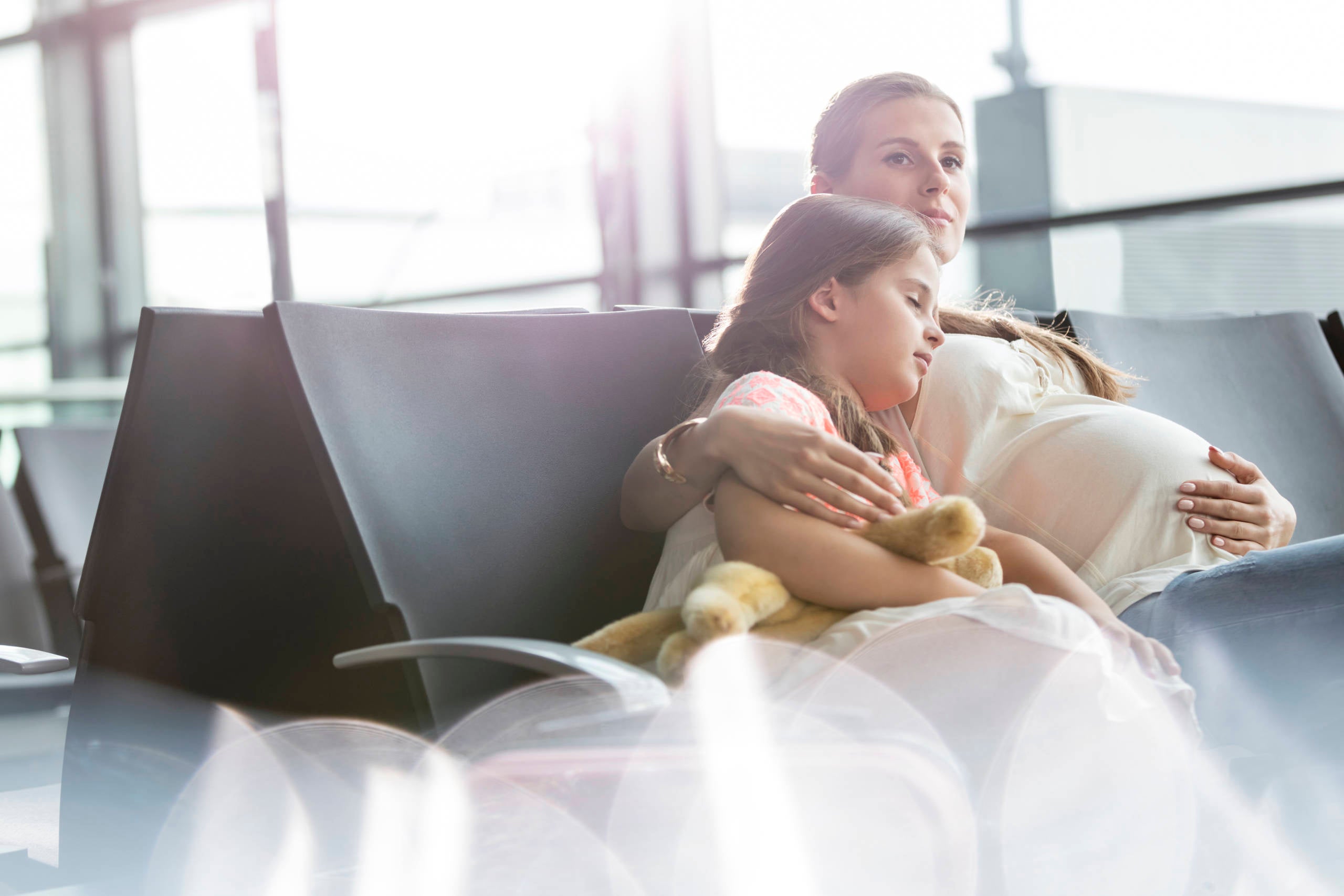
The most important thing you can do, no matter how far along you are in your pregnancy, is to consult with your healthcare provider before flying.
"Any time you are planning to fly during pregnancy , you should be having that conversation," Dr. Gopal said. Your provider will be familiar with any safety precautions you should take to ensure a safe and healthy flight.
Related: Guide to flying in each trimester of pregnancy
The airline you are flying may have its own cutoff, so you will want to confirm with it beforehand whether you will be allowed to fly if you are in (or nearing) your third trimester. We've included a chart below that outlines the rules for most major airline carriers.
What can you do to stay comfortable on a flight?
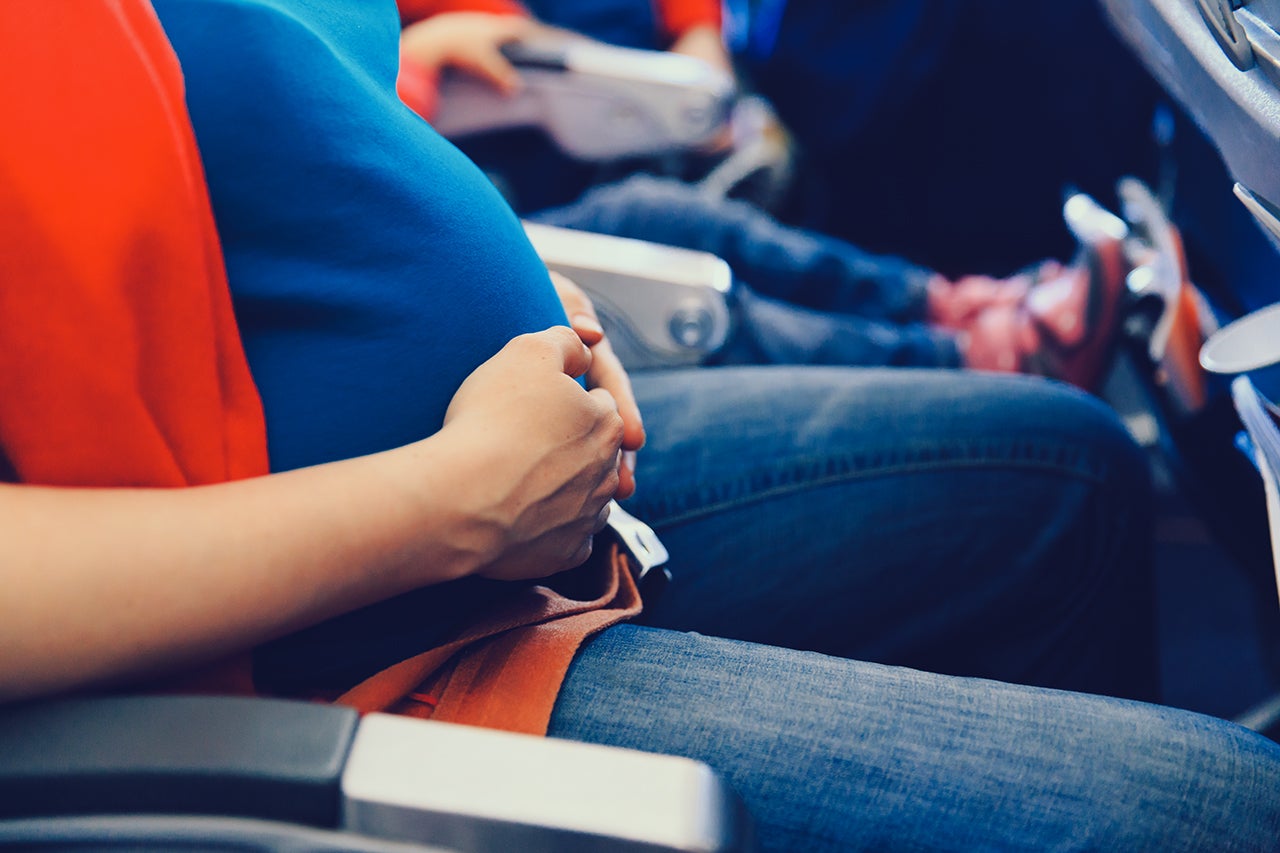
When you factor in morning sickness and general pregnancy discomfort with the increased risk for blood clots that all fliers need to be aware of, flying during pregnancy can be uncomfortable even when it is deemed safe.
Dr. Gopal shared her recommendations for addressing these common issues when you take to the (baby-) friendly skies during pregnancy. Her number one tip for staying comfortable while in flight is to wear compression socks to help maintain blood flow and reduce swelling in the legs.
In addition, "I also tell my patients to get up and move at least every hour when they are on the plane," Dr. Gopal said.
To prevent clotting, "some doctors may also prescribe a low-dose aspirin," she added. "It isn't something that is recommended by the American College of Obstetricians and Gynecologists (ACOG), but it isn't harmful, either."
If it's nausea or acid reflux that ail you, there are medications generally considered safe that you can take to alleviate your symptoms. These would be the same ones prescribed by your doctor for morning sickness, so speak with your provider before your flight to ensure you have what you need at the ready.
Dr. Gopal also advises wearing loose, unrestrictive clothing (along with your seatbelt, or course) and drinking extra fluids to counteract the pressurized air in the cabin and keep you hydrated.
"Over-the-counter Gas-X may also help with bloating that can happen as a result of the pressurized air," Dr. Gopal said.
Related: What happens when a baby is born in flight?
Must you speak with your healthcare provider before flying?

Even if your pregnancy is considered low-risk, it's always a smart idea to speak with your healthcare provider before flying. "There are a number of potential risks that go along with flying during pregnancy and those risks can change from week to week and month to month, so it's important to have that honest conversation with your doctor," Dr. Gopal said.
Related: Things You Should Do Before, During and After Flying to Stay Healthy
There are certain pregnancy conditions that may make flying more risky or unadvisable. If you are hypertensive, asthmatic or prone to clotting disorders, it's even more critical to speak with your doctor before flying.
Airline policies differ, but if you need documentation, it never hurts to include enough detail to satisfy the most stringent airline requirements.
"As with many things related to air travel, it's better to be safe than sorry," Dr. Gopal said. "It's definitely worth it, and sometimes necessary, to have medical documentation from your provider's office."
A thorough medical certificate or waiver should state:
- The number of weeks of pregnancy.
- The estimated delivery date.
- Whether the pregnancy is single or multiple.
- Whether there are any complications.
- That you are in good health and fit to travel through the date of your final flight.
Additionally, the certificate should be:
- Written on official clinic or hospital letterhead if possible.
- Signed by the doctor or attending midwife.
- Be dated no later than 72 hours before the departure date.
- Be written in clear, simple English.
Carry this certificate with you on your flight. Some airlines won't ask to see it, but others will. Some airlines also may have their own documentation requirements. See the chart below to find out which airlines require it.
Airline policies for pregnant women
Bottom line.
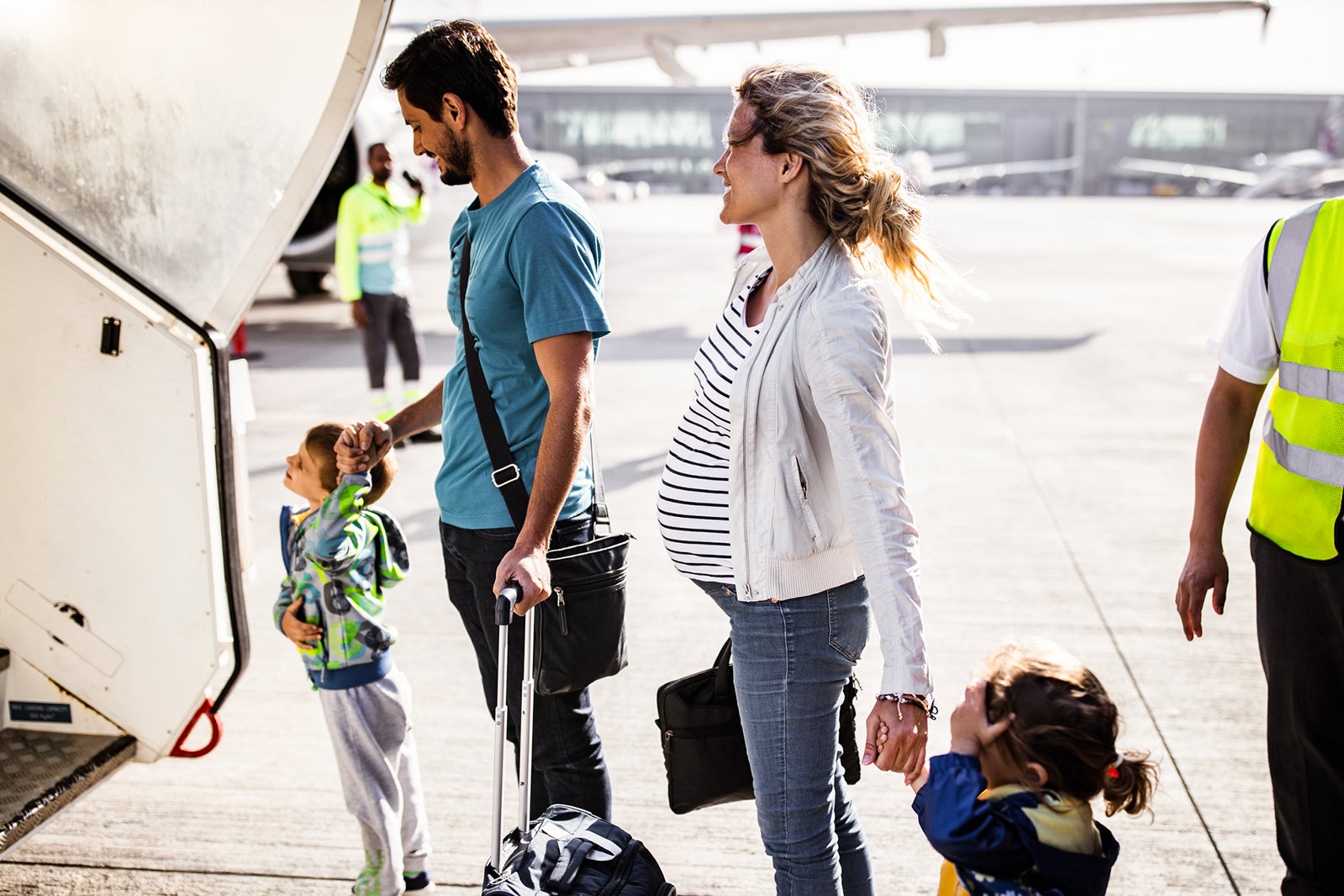
Even though it may be deemed safe, flying during pregnancy can be uncomfortable — and it is perfectly acceptable to implement your own cutoff for flying with your baby bump in tow. The majority of the time, though, flying is perfectly safe during pregnancy, providing that you follow the guidelines of the airline and your healthcare provider. Read on to learn more about traveling before, during and after pregnancy:
- What to expect in every trimester of pregnancy
- 4 tips for planning travel while planning a pregnancy
- Babymoon boom! These are the top 10 spots for a US getaway before the baby comes
- Flying with a baby checklist
Additional reporting by Katherine Fan and Tarah Chieffi.
- Trying to Conceive
- Signs & Symptoms
- Pregnancy Tests
- Fertility Testing
- Fertility Treatment
- Weeks & Trimesters
- Staying Healthy
- Preparing for Baby
- Complications & Concerns
- Pregnancy Loss
- Breastfeeding
- School-Aged Kids
- Raising Kids
- Personal Stories
- Everyday Wellness
- Safety & First Aid
- Immunizations
- Food & Nutrition
- Active Play
- Pregnancy Products
- Nursery & Sleep Products
- Nursing & Feeding Products
- Clothing & Accessories
- Toys & Gifts
- Ovulation Calculator
- Pregnancy Due Date Calculator
- How to Talk About Postpartum Depression
- Editorial Process
- Meet Our Review Board
Safety of Air Travel During Pregnancy
E+ / Getty Images
Pregnancy was once seen as something that sent women to their homes once their bellies began to protrude (hence the term "confinement"). It was not considered appropriate for pregnant people to be seen in public.
Nowadays pregnancy rarely changes schedules, with the exception of high-risk pregnancies or other complications. People usually can continue their normal lives for the duration of the pregnancy, with minor exceptions (like knowing where all the bathrooms are!). Travel is no exception.
Travel is becoming more prevalent as families move further and further apart. Traveling for holidays, or as the last trip to see the family before the baby comes, or as a last romantic vacation, is not unusual. This includes out of the country travel and often air travel.
The Science on Pregnancy and Air Travel
For ethical reasons, there are not many studies on air travel and miscarriage rates. One 2015 study showed a slight increase in first-trimester miscarriage for flight attendants, but this was often associated with high physical job demands and disruptions to their sleep cycles.
In-flight radiation is also a slight risk for flight attendants. An estimated 2% of flight attendants are exposed to a solar particle event during their pregnancies, although the amount of radiation varies by length of time in the air, the routes flown, and so on. However, the risk to the average flier is negligible. The average 10-hour flight only exposes fliers to 0.05 mSv of radiation, or 1/1000th of the limit set by the American Congress of Obstetricians and Gynecologists.
Precautions for Air Travel During Pregnancy
Flying is fairly safe while pregnant, even for flight attendants, with some minor adjustments. There are, however, some issues to bear in mind if you are pregnant and considering multiple, frequent, or very long flights:
- Air travel is extremely dehydrating. You'll need to drink a lot of water while in the air.
- Air travel requires that you sit still for long periods. If you're likely to experience cramps or other pregnancy-associated issues, you may be quite uncomfortable.
- Airplanes are not equipped to handle in-air birth or pregnancy-related complications . Even if your airline permits travel, you may simply be smarter to stay on the ground if you're close to giving birth or are experiencing any pregnancy-related issues.
There are some precautions that a pregnant traveler should consider:
- Talk to your practitioner before flying. If you are more than 36 weeks pregnant, many airlines will not let you fly for fear that you'll deliver on board.
- Try to do the majority of your traveling in the second trimester . Not only will you be more comfortable, but in general the risks of miscarriage and preterm labor are lower.
- Avoid excessive flying. Although there are no hard and fast numbers, one study found that flight attendants with higher miscarriage rates flew on average 74 hours per month.
- Make comfort arrangements. Try to get seats with more legroom, plan to walk in the aisles, anticipate bathroom breaks, and bring water.
- Avoid travel to countries that would require immunizations that you don't already have or are that are not considered safe for pregnancy. Talk to your practitioner for more info on immunizations during pregnancy, as some immunizations are considered appropriate while pregnant.
- Because pregnant people are more vulnerable to COVID-19, you may wish to avoid unnecessary travel, particularly to high-risk areas.
So remember, flying is not contraindicated in an uncomplicated pregnancy, but use your common sense and speak to your practitioner about your travel plans.
Grajewski B, Whelan EA, Lawson CC, et al. Miscarriage among flight attendants . Epidemiology . 2015;26(2):192-203. doi:10.1097/EDE.0000000000000225
Hezelgrave NL, Whitty CJM, Shennan AH, Chappell LC. Advising on travel during pregnancy . BMJ. 2011;342:d2506. doi:10.1136/bmj.d2506
Zubac D, Stella AB, Morrison SA. Up in the air: Evidence of dehydration risk and long-haul flight on athletic performance . Nutrients . 2020;12(9):2574-2589. doi:10.3390/nu12092574
Cone JE, Vaughan LM, Huete A, Samuels S. Reproductive health outcomes among female flight attendants: An exploratory study . J Occup Environ Med. 1998;40(3):210-216.
Ellington S, Strid P, Tong VT, et al. Characteristics of women of reproductive age with laboratory-confirmed SARS-CoV-2 infection by pregnancy status — United States, January 22–June 7, 2020 . MMWR Morb Mortal Wkly Rep. 2020;69(25):769-775. doi:10.15585/mmwr.mm6925a1
By Robin Elise Weiss, PhD, MPH Robin Elise Weiss, PhD, MPH is a professor, author, childbirth and postpartum educator, certified doula, and lactation counselor.
- Book your antenatal a course
- Volunteer with us
Flying when pregnant: what you need to know
Read time 6 minutes
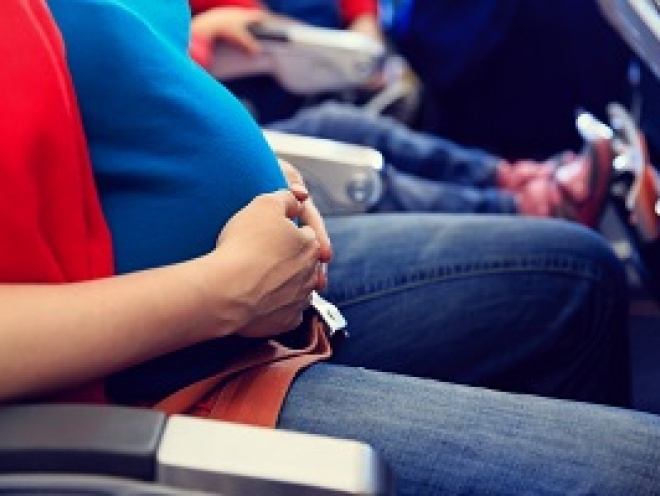
If you’re feeling unsure about whether you can hop on that plane when you’re expecting, here’s the info.
Can I fly at one, two or three months pregnant (first trimester)?
Yes, there is no evidence that flying causes miscarriage (RCOG, 2015) . Yet as this is the riskiest time for miscarriage , just be aware that no medical help will be available if that does happen. You also might feel nauseous and exhausted, so that’s something to think about too.
Can I fly at four, five or six months pregnant (second trimester)?
Good news if you’re thinking of going away in the second trimester: it’s considered the safest time to fly (Hezelgrave et al, 2011) . That’s mainly because the risk of pregnancy-related complications, including miscarriage, is lower during the second trimester than in the first and third (Hezelgrave et al, 2011) .
Can I fly at seven, eight or nine months pregnant (third trimester)?
It’s fine to fly in the third trimester but you’re advised to do it before 37 weeks, or before 32 weeks in an uncomplicated twin pregnancy . That’s because you could go into labour any time after those dates (RCOG, 2015) .
Do still check with your specific airline before you fly though. Many airlines have restrictions on travel in advanced pregnancy (Hezelgrave et al, 2011) .
Flying when pregnant: the worries and concerns
First of all, you should know that flying is not considered harmful to you or your baby if you’re having a straightforward pregnancy.
You might feel a bit uncomfortable flying at certain stages of pregnancy. For example, you might have swollen legs, pregnancy sickness , nasal congestion (more common during pregnancy) or ear problems during pressure changes due to this congestion (RCOG, 2015) .
A change in air pressure or a decrease in humidity won’t cause your baby any harm. There is also no evidence to suggest that flying causes miscarriages, early labour or waters to break (RCOG, 2015) . If you have any health issues or pregnancy complications, discuss it with your GP or midwife before you decide to fly. They might advise you not to fly if you have:
- severe anaemia
- sickle cell disease
- significant vaginal bleeding
- a serious heart or lung condition that makes it difficult to breathe
- increased risk of going into labour before the due date
- increased chance of miscarriage or ectopic pregnancy (request an ultrasound before flying)
- previous history of ectopic pregnancy, pelvic inflammatory disease, infertility and documented tubal pathology.
(Hezelgrave et al, 2011; RCOG, 2015)
Deep vein thrombosis (DVT) when pregnant and flying
A DVT is a blood clot that develops in a deep vein in your leg or pelvis. It’s dangerous if a DVT travels to your lungs and causes a pulmonary embolism.
The risk of DVT increases when you’re flying and with longer flights because you are sitting down for a long time. You’re also at a higher risk of developing a DVT when you are pregnant and for up to six weeks after you give birth (RCOG, 2015) . Risk factors like a previous history of DVT and a high BMI can further increase your chance of developing a DVT.
Your doctor or midwife will be able to check your risk of developing DVT and advise you about flying.
How to reduce your risk of DVT
You can reduce your risk of DVT by:
- wearing loose clothing and comfy shoes
- getting an aisle seat and going for regular walks around the plane
- doing in-seat exercises every 30 minutes (ask your GP about how to do these)
- drinking plenty of water
- avoiding drinks containing alcohol and caffeine
- wearing graduated elastic compression stockings to help reduce leg swelling.
(RCOG, 2015; NHS Choices, 2016)
Flying when pregnant: general tips
- Take your hand-held pregnancy notes.
- Carry any medication in your hand luggage.
- Carry any documents confirming your due date and (if needed) that you are fit to travel. If you are 28 weeks pregnant or more, the airline you are travelling with might ask for a letter from your midwife or doctor stating your due date, that you’re in good health, have no complications and have a straightforward pregnancy.
- Carry your travel insurance documents with you too or make sure you have access to them if they’re on email.
- Carry your European Health Insurance Card (EHIC) with you if you are travelling to Europe. You can apply online for one for free .
- Seatbelt wise, it’s recommended that you strap your seatbelt reasonably tightly across the top of your thighs and then under your bump. If you need a seatbelt extension, ask cabin crew.
Travel vaccinations when pregnant – are they safe?
There’s no evidence of risk from vaccinations that contain inactivated virus, bacterial vaccines or toxoids when you’re pregnant (CDC, 2017) . However, avoid live vaccines like yellow fever because of the risk of contracting a disease that might harm your developing baby (Hezelgrave et al, 2011) .
If you need advice on specific travel vaccinations, contact your doctor or midwife. Some anti-malarial tablets are not safe to be taken during pregnancy, so consult your GP or midwife about those too (NHS Choices, 2016) .
This page was last reviewed in May 2018.
Further information
Our support line offers practical and emotional support with feeding your baby and general enquiries for parents, members and volunteers: 0300 330 0700.
We also offer antenatal courses which are a great way to find out more about birth, labour and life with a new baby.
CDC. (2017) Guidelines for vaccinating pregnant women. Available from: https://www.cdc.gov/vaccines/pregnancy/hcp/guidelines.html [Accessed 11th May 2018]
Hezelgrave NL, Shennan AH, Chappell LC. (2011) Advising on travel during pregnancy. BMJ.342. Available from: https://www.bmj.com/content/342/bmj.d2506.long [Accessed 11th May 2018]
NHS Choices. (2016) Travelling in pregnancy. Available from: https://www.nhs.uk/conditions/pregnancy-and-baby/travel-pregnant/#car-travel-in-pregnancy [Accessed 11th May 2018]
RCOG. (2015) Air travel and pregnancy. Available from: https://www.rcog.org.uk/globalassets/documents/patients/patient-information-leaflets/pregnancy/air-travel-pregnancy.pdf [Accessed 11th May 2018]
Rodger MA, Walker M, Wells PS. (2003) Diagnosis and treatment of venous thromboembolism in pregnancy. Best Pract Res Clin Haematol. 16:279-296. Available from: https://www.ncbi.nlm.nih.gov/pubmed/12763492 [Accessed 11th May 2018]
Information you can trust from NCT
When it comes to content, our aim is simple: every parent should have access to information they can trust.
All of our articles have been thoroughly researched and are based on the latest evidence from reputable and robust sources. We create our articles with NCT antenatal teachers, postnatal leaders and breastfeeding counsellors, as well as academics and representatives from relevant organisations and charities.
Read more about our editorial review process .
Related articles
Courses & workshops

In-person NCT Antenatal course

NCT Antenatal refresher course

You are using an outdated browser. Upgrade your browser today or install Google Chrome Frame to better experience this site.
Pregnant Travelers

Pregnant travelers can generally travel safely with appropriate preparation. But they should avoid some destinations, including those with risk of Zika and malaria. Learn more about traveling during pregnancy and steps you can take to keep you and your baby healthy.
Before Travel
Before you book a cruise or air travel, check the airlines or cruise operator policies for pregnant women. Some airlines will let you fly until 36 weeks, but others may have an earlier cutoff. Cruises may not allow you to travel after 24–28 weeks of pregnancy, and you may need to have a note from your doctor stating you are fit to travel.
Zika and Malaria
Zika can cause severe birth defects. The Zika virus is spread through mosquito bites and sex. If you are pregnant, do not travel to areas with risk of Zika . If you must travel to an area with Zika, use insect repellent and take other steps to avoid bug bites. If you have a sex partner who lives in or has traveled to an area with Zika, you should use condoms for the rest of your pregnancy.
Pregnant travelers should avoid travel to areas with malaria, as it can be more severe in pregnant women. Malaria increases the risk for serious pregnancy problems, including premature birth, miscarriage, and stillbirth. If you must travel to an area with malaria, talk to your doctor about taking malaria prevention medicine. Malaria is spread by mosquitoes, so use insect repellent and take other steps to avoid bug bites.
Make an appointment with your healthcare provider or a travel health specialist that takes place at least one month before you leave. They can help you get destination-specific vaccines, medicines, and information. Discussing your health concerns, itinerary, and planned activities with your provider allows them to give more specific advice and recommendations.
Plan for the unexpected. It is important to plan for unexpected events as much as possible. Doing so can help you get quality health care or avoid being stranded at a destination. A few steps you can take to plan for unexpected events are to get travel insurance , learn where to get health care during travel , pack a travel health kit , and enroll in the Department of State’s STEP .
Be sure your healthcare policy covers pregnancy and neonatal complications while overseas. If it doesn’t get travel health insurance that covers those items. Consider getting medical evacuation insurance too.
Recognize signs and symptoms that require immediate medical attention, including pelvic or abdominal pain, bleeding, contractions, symptoms of preeclampsia (unusual swelling, severe headaches, nausea and vomiting, and vision changes), and dehydration.
Prepare a travel health kit . Pregnant travelers may want to include in your kit prescription medications, hemorrhoid cream, antiemetic drugs, antacids, prenatal vitamins, medication for vaginitis or yeast infection, and support hose, in addition to the items recommended for all travelers.
During Travel
Your feet may become swollen on a long flight, so wear comfortable shoes and loose clothing and try to walk around every hour or so. Sitting for a long time, like on long flight, increases your chances of getting blood clots, or deep vein thrombosis. Pregnant women are also more likely to get blood clots. To reduce your risk of a blood clot, your doctor may recommend compression stockings or leg exercises you can do in your seat. Also, see CDC’s Blood Clots During Travel page for more tips on how to avoid blood clots during travel.
Choose safe food and drink. Contaminated food or drinks can cause travelers’ diarrhea and other diseases and disrupt your travel. Travelers to low or middle income destinations are especially at risk. Generally, foods served hot are usually safe to eat as well as dry and packaged foods. Bottled, canned, and hot drinks are usually safe to drink. Learn more about how to choose safer food and drinks to prevent getting sick.
Pregnant women should not use bismuth subsalicylate, which is in Pepto-Bismol and Kaopectate. Travelers to low or middle income destinations are more likely to get sick from food or drinks. Iodine tablets for water purification should not be used since they can harm thyroid development of the fetus.
After Travel

If you traveled and feel sick, particularly if you have a fever, talk to a healthcare provider immediately, and tell them about your travel. Avoid contact with other people while you are sick.
More Information
CDC Yellow Book: Pregnant Travelers
File Formats Help:
- Adobe PDF file
- Microsoft PowerPoint file
- Microsoft Word file
- Microsoft Excel file
- Audio/Video file
- Apple Quicktime file
- RealPlayer file
- Zip Archive file
Exit Notification / Disclaimer Policy
- The Centers for Disease Control and Prevention (CDC) cannot attest to the accuracy of a non-federal website.
- Linking to a non-federal website does not constitute an endorsement by CDC or any of its employees of the sponsors or the information and products presented on the website.
- You will be subject to the destination website's privacy policy when you follow the link.
- CDC is not responsible for Section 508 compliance (accessibility) on other federal or private website.

find your way around
baby planner, nurse, &
Maternity concierge
already a member?
sign in here
- First Trimester , Pregnancy
Flying In First Trimester? How To Travel Safely While Pregnant
- May 13, 2022
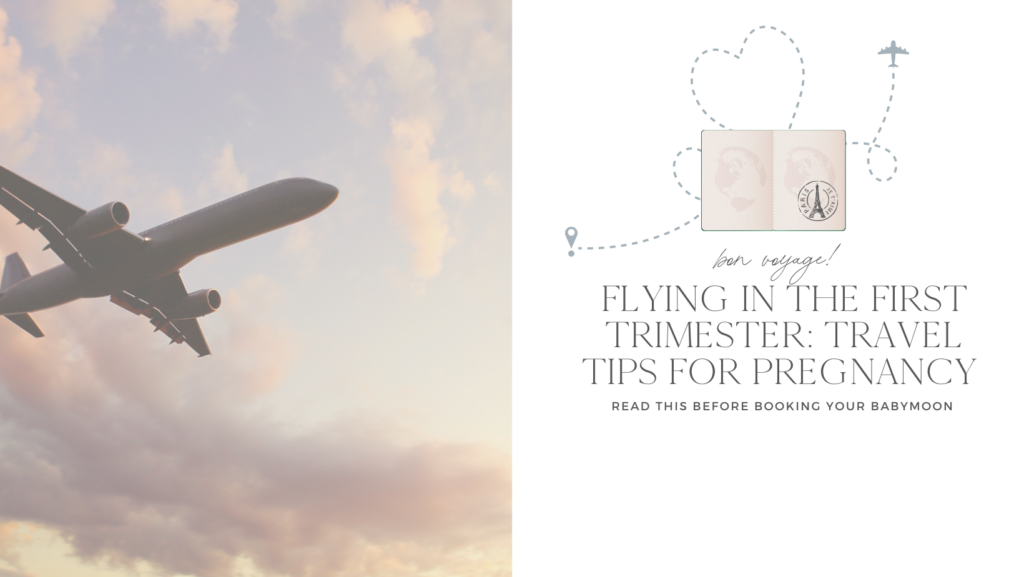
For years, pregnant women have been told that flying is not safe during their first trimester. But is this really true? Or are there ways to prevent any potential complications? In this blog post, we will explore the truth about flying during pregnancy and give you some tips on how to stay safe while traveling.
{We are a participant in the Amazon Services LLC Associates Program, an affiliate advertising program designed to provide a means for us to earn fees by linking to Amazon.com and affiliated sites. To learn more about affiliate links, click here! }

Flying in First Trimester: Is It Ok?
For pregnant women, flying during the first trimester is generally considered safe. However, there are a few things to consider before booking a flight. First, pregnant women are more likely to experience nausea and vomiting during the first trimester, so it’s important to make sure you’re feeling up for travel. Second, you’ll want to be aware of the risk of pregnancy complications such as miscarriage and ectopic pregnancy. According to the American College of Obstetricians and Gynecologists , the risk of these complications is highest during the first trimester. If you’re pregnant and thinking about flying, be sure to talk to your doctor first to make sure it’s the right decision for you.

Considerations When Flying for Pregnant Women
For most pregnant women, flying is perfectly safe. However, there are a few things to keep in mind when planning to fly during pregnancy.
First, pregnancy complications can occasionally make flying unsafe. If you have any concerns, be sure to check with your health care provider before booking a flight.
Second, even healthy pregnancies can come with some unpleasant side effects like nausea and fatigue. Taking a long flight while feeling nauseous or exhausted is no fun for anyone, so it’s important to make sure you’re feeling up to it before you board the plane.
Finally, remember that flying can be dehydrating, so it’s important to drink plenty of water before, during, and after your flight. By following these simple tips, you can ensure that your next flight is as smooth and comfortable as possible.

Tips for Air Travel During Pregnancy
For many women, the thought of flying while pregnant is enough to make them break out in a cold sweat. After all, there are so many things that can go wrong. But with a little planning and preparation, air travel during pregnancy can be relatively smooth sailing. Here are a few tips to keep in mind:
Get an Aisle Seat:
This will give you more room to move around and make trips to the bathroom.
Make sure you have travel insurance
This will give you peace of mind in case anything does go wrong.
Travel in the 2nd Trimester
Try to travel during the second trimester if possible. This is generally the safest and most comfortable time for pregnant women.
Avoid Gassy Foods
It’s not just your imagination – being pregnant does make you gassier than usual. To avoid embarrassing yourself (and your fellow passengers), steer clear of foods that are known to cause bloating, such as Brussels sprouts, beans, and broccoli. Instead, opt for lighter fare that won’t leave you feeling bloated and uncomfortable.
Avoid Carbonated Drinks
Just like gas-producing foods, carbonated beverages can also cause bloating and discomfort. So instead of that soda or sparkling water, stick to plain old H20.
Wear Support Stockings
They may not be the most stylish item in your wardrobe, but they can help to reduce swelling in your legs and feet. Plus, they’ll make it more comfortable to walk through the airport.
Dress in Loose-Fitting Clothing
You’re going to be sitting for a long time, so you might as well be comfortable. Loose-fitting clothing will also help you to avoid any unwanted wardrobe malfunctions.
Carry On Only What You Need
The last thing you want is to have to lug a heavy suitcase through the airport. So pack light and only bring carry-on luggage.
Drink Plenty of Water
It’s important to stay hydrated during pregnancy, and that includes during air travel. drink plenty of water throughout the flight, and avoid alcohol altogether.
Get Up and Move Around
Every hour or so, get up and stretch your legs. This will help to keep your blood flowing and prevent discomfort.
Wear Comfortable Shoes
Again, comfort is key when flying while pregnant. Wear shoes that are easy to slip on and off so you can take them off during security screenings. And avoid heels or any other uncomfortable shoes.
Bring snacks
Airport food can be expensive, and it’s not always the healthiest option. So bring your own snacks to tide you over until you reach your destination.
Flying while pregnant doesn’t have to be a stressful experience. By following these simple tips, you can ensure a smooth and comfortable flight.

More Travel Tips for Pregnancy
There’s no need to put your travel plans on hold just because you’re pregnant. With a little planning and common sense, you can still enjoy the trip of a lifetime. Here are a few tips to help you travel safely during pregnancy:
First, make sure you have comprehensive health insurance that will cover you in case of any complications. Pregnant travelers should also consult with their health care provider before traveling, and make sure they have all the necessary health records with them.
Second, take extra care to stay healthy while on the road. Pregnant women are more susceptible to illness, so be sure to eat healthy meals, get plenty of rest, and drink plenty of fluids. If possible, avoid traveling during peak illness seasons such as winter and summer.
Third, be prepared for changes in your plans. Unfortunately, pregnancy often comes with unpredictable physical changes that can impact your travel plans. Make sure you have a flexible itinerary and are prepared to change your plans at a moment’s notice.
Drink plenty of water . Dehydration can cause pregnancy complications, so it’s important to stay well hydrated. Be sure to drink only bottled water or filtered water, and avoid tap water completely.
Stay close to medical help. If possible, choose a destination that is close to a hospital or medical clinic. This way, if you experience any problems during your trip, you can get help quickly.
Take your time. Pregnancy can be exhausting, so don’t try to do too much. Take breaks often, and plan for plenty of rest time each day.
By following these simple tips, you can travel safely and enjoyably during pregnancy. Bon voyage!

If you experience any of the following symptoms during or after a flight, it’s important to seek medical attention: shortness of breath, chest pain, swelling in the legs or feet, fainting, or unusual fatigue.
Complications To Watch For While Traveling During Pregnancy
There’s nothing quite like the excitement of planning a pregnancy-safe vacation. But as any seasoned traveler knows, there are always a few potential complications to watch out for . Here are a few things to keep in mind if you’re pregnant and planning to hit the road:
Seek Emergency Medical Care If You Experience…
- Severe Vomiting: Persistent vomiting can lead to dehydration, which can be dangerous for both you and your baby. If you can’t keep anything down, seek medical care immediately.
- Fever: A fever during pregnancy can be a sign of infection, which can be dangerous for both you and your baby. If you develop a fever while traveling, seek medical care right away.
- Severe pain: Severe abdominal or pelvic pain can be a sign of a serious problem, such as an ectopic pregnancy or placental abruption. If you experience severe pain while traveling, seek medical care immediately.
- Severe Headache: A severe headache can be a sign of preeclampsia (severely high blood pressure), a potentially dangerous condition that can occur during pregnancy. If you experience a severe headache, seek medical care right away.
- Pain &/Or Swelling In Your Legs: This can be a sign of deep vein thrombosis (DVT), a potentially dangerous condition that can occur during pregnancy. If you experience pain or swelling in your legs, seek medical care right away.
These are just a few potential complications to watch out for while traveling during pregnancy. Remember, if you have any concerns at all, don’t hesitate to seek medical care. Better safe than sorry!

Reasons To Avoid Traveling While Pregnant
While there are plenty of good reasons to travel while pregnant, there are also a few potential risks to consider. Here are a few things to keep in mind before you hit the road:
You May Be at Higher Risk for Infection:
Pregnant women are more susceptible to infection, so it’s important to take extra care to avoid exposure to germs. If possible, avoid traveling during peak illness seasons such as winter and summer.

You May Experience Changes in Your Plans:
Unfortunately, pregnancy often comes with unpredictable physical changes that can impact your travel plans. Make sure you have a flexible itinerary and are prepared to change your plans at a moment’s notice.
You May Feel More Tired Than Usual:
Pregnancy can be exhausting, so don’t try to do too much. Take breaks often, and plan for plenty of rest time each day.
You May Be A High-Risk Pregnancy:
If you have a high-risk pregnancy, your doctor may advise against travel. Be sure to check with your doctor before making any travel plans.
You May Experience Unpleasant Pregnancy Symptoms:
Traveling while pregnant can exacerbate common pregnancy symptoms such as nausea, vomiting, and fatigue. If you’re not feeling up to traveling, it’s probably best to stay home.

FAQs About Flying In Pregnancy
Flying while pregnant might seem like a daunting prospect, but with a little bit of planning, it can be a breeze. Here are a few frequently asked questions that can help put your mind at ease.
Q- Can I fly during pregnancy?
As long as you have a healthy pregnancy , flying should pose no problem. However, it’s always a good idea to check with your doctor before booking a flight.
Q- How far along in my pregnancy can I fly?
Most airlines allow pregnant women to fly up to 36 weeks of pregnancy. After that point, you’ll need a doctor’s note confirming that it’s safe for you to travel.
Q- Can I fly if I’m having twins?
Yes, but most airlines limit pregnant women with twins to 32 weeks of pregnancy. You’ll also need a doctor’s note confirming that it’s safe for you to travel.
Q- When Should I Stop Traveling During Pregnancy?
Most experts recommend avoiding travel in the last month of pregnancy to reduce the risk of preterm labor. If you must travel during this time, be sure to have a plan in place in case you go into labor while on the road.
Q- How Should I Prepare for a Trip During Pregnancy?
There are a few things you can do to prepare for a trip during pregnancy:
– Get travel insurance that covers pregnancy complications.
– Choose a comfortable destination and accommodation.
– Pack light and bring plenty of snacks and water.
– Wear loose, comfortable clothing.
– Bring your prenatal records in case you need medical care while on the road.
Q- Can I Fly In The First 12 Weeks of Pregnancy?
Flying in the first trimester is generally considered safe, but you should check with your doctor before booking a flight. The main risk during this time is dehydration, so make sure to drink plenty of water both before and during your flight. Other than that, the risks are generally low.
Q- Will Flying in the 1st Trimester Cause a Miscarriage?
The risk of miscarrying after flying in the first trimester is very low. In most cases, miscarriage is caused by a chromosomal abnormality that is not related to flying.
Q- How can I make flying during pregnancy safer?
Check with your healthcare provider before booking your flight. They can help you determine if flying is safe for you and your baby.
Choose an airline that offers pregnant passengers special assistance, such as early boarding or priority seating.
Dress comfortably for your flight, and wear loose-fitting clothing to avoid swelling.
Stay hydrated by drinking plenty of fluids.
Get up and move around every few hours to avoid blood clots.
Listen to your body, and if you experience any pain or discomfort, let a flight attendant know right away.
Q- What are the symptoms of flight-related illness in pregnancy?
While the vast majority of pregnant women will have no problems with flying, there are a few conditions that can be exacerbated by the changes in cabin pressure and air quality.
Although these symptoms can be benign, they can also be indicative of more serious problems like deep vein thrombosis or pulmonary embolism.
Q- How can I avoid getting sick while flying during pregnancy?
First, make sure to drink plenty of fluids. Airplane cabins are very dry, so it’s important to stay hydrated. Second, avoid touching your face. There are all sorts of germs on airplane tray tables and armrests, so it’s best to keep your hands away from your eyes, nose, and mouth. Finally, take some preventative measures before you fly. Get a flu shot and pack some hand sanitizer in your carry-on bag.
Q- Should I consult with my doctor before flying during pregnancy?
If you’re pregnant and planning to fly, you might be wondering if you need to consult with your doctor first. The answer is, that it depends. If you have a high-risk pregnancy, it’s a good idea to check with your doctor before booking a flight. However, if you’re healthy and your pregnancy is low-risk, flying is generally considered safe.
Of course, there are always risks involved when traveling by plane, so it’s important to be aware of the potential risks before you take off. The good news is that most pregnant women experience no problems when flying. So whether you’re headed for a babymoon or just visiting family, make sure to do your research and travel safely.
Hopefully, these tips have helped to put your mind at ease about flying during pregnancy. Remember, as long as you take a few precautions and check with your doctor, flying should pose no problem. Safe travels!
More Posts You’ll Love…
- Ultimate First Trimester Of Pregnancy Checklist
- 40 First Grandchild Pregnancy Announcement Gifts & Ideas
- The Best Push Presents for New Moms
- A Second Trimester To Do List
- When To Start Wearing Maternity Clothes
- When To Have A Baby Shower
- The Best Virtual Baby Shower Games
- Signs That Labor 24-48 Hours Away
- Hospital Bag Checklist 2022- The Ultimate Guide
- When To Start Buying Baby Stuff
- What The Hospital Provides After Birth
- 50+ Pregnancy Announcement Ideas: How To Tell Your Husband You’re Pregnant
Leave a Reply Cancel reply
Your email address will not be published. Required fields are marked *

JOIN THE LIST
Monthly ideas, special offers & our latest favorites including a Spotify Playlist, exclusive discount codes, & more right in your inbox.


- Pregnancy Classes

Travel During Pregnancy
As long as there are no identified complications or concerns with your pregnancy, it is generally safe to travel during your pregnancy. The ideal time to travel during pregnancy is the second trimester . In most cases, you are past the morning sickness of the first trimester and several weeks from the third stage of pregnancy when you are more easily fatigued .
Is it safe to travel during pregnancy?
Traveling by air is considered safe for women while they are pregnant; however, the following ideas might make your trip safer and more comfortable.
- Most airlines allow pregnant women to travel through their eighth month. Traveling during the ninth month is usually allowed if there is permission from your health care provider.
- Most airlines have narrow aisles and smaller bathrooms, which makes it more challenging to walk and more uncomfortable when using the restroom. Because of potential turbulence that could shake the plane, make sure you are holding on to the seatbacks while navigating the aisle.
- You may want to choose an aisle seat which will allow you to get up more easily to reach the restroom or just to stretch your legs and back.
- Travel on major airlines with pressurized cabins and avoid smaller private planes. If you must ride in smaller planes, avoid altitudes above 7,000 feet.
- Although doubtful, the risk of DVT can be further reduced by wearing compression stockings.
The Royal College of Obstetricians and Gynaecologists and the International Air Travel Association recommend that expecting mothers in an uncomplicated pregnancy avoid travel from the 37th week of pregnancy through birth. Avoiding travel from 32 weeks through birth is recommended for women who have complicated pregnancies with risk factors for premature labor, such as mothers carrying multiples.
Risk factors that warrant travel considerations include the following:
- Severe anemia
- Cardiac disease
- Respiratory disease
- Recent hemorrhage
- Current or recent bone fractures
Traveling by Sea During Pregnancy
Traveling by sea is generally safe for women while they are pregnant; the motion of the boat may accentuate any morning sickness or make you feel nauseous all over again. There are a few considerations to make your trip safer and more comfortable:
- Check with the cruise line to ensure that there is a health care provider on board in case there are any pregnancy complications .
- Review the route and port-of-calls to identify if there is access to any medical facilities if needed.
- Make sure any medications for seasickness are approved for women who are pregnant and that there is no risk to the developing baby.
- Seasickness bands use acupressure points to help prevent upset stomach and maybe a good alternative to medication.
International Travel During Pregnancy
Traveling overseas has the same considerations that local or domestic travel has, but it also has additional concerns that you need to know about before making an international trip. The information below is provided to help you assess whether an international trip is good for you at this time:
- It is important to talk with your health care provider before you take a trip internationally to discuss safety factors for you and your baby.
- Discuss immunizations with your health care provider and carry a copy of your health records with you.
- With international travel, you may be exposed to a disease that is rare here in the United States but is common in the country you visit.
- Contact the Centers for Disease Control and Prevention at (800) 311-3435 or visit their website at www.cdc.gov to receive safety information along with immunization facts related to your travels.
- Diarrhea is a common concern when traveling overseas because you may not be used to the germs and organisms found in the food and water of other countries. This can lead to a problem of dehydration .
Here are some tips to avoid diarrhea and help keep you safe:
- Drink plenty of bottled water
- Used canned juices or soft drinks as alternatives
- Make sure the milk is pasteurized
- Avoid fresh fruits and vegetables unless they have been cooked or can be peeled (such as an orange or a banana)
- Make certain that all meat and fish has been cooked completely; if you are unsure, do not eat it
Travel Tips During Pregnancy
Whether you are going by car, bus, or train, it is generally safe to travel while you are pregnant; however, there are some things to consider that could make your trip safer and more comfortable.
- It is essential to buckle-up every time you ride in a car. Make sure that you use both the lap and shoulder belts for the best protection of you and your baby.
- Keep the airbags turned on. The safety benefits of the airbag outweigh any potential risk to you and your baby.
- Buses tend to have narrow aisles and small restrooms. This mode of transportation can be more challenging. The safest thing is to remain seated while the bus is moving. If you must use the restroom, make sure to hold on to the rail or seats to keep your balance.
- Trains usually have more room to navigate and walk. The restrooms are usually small. It is essential to hold on to rails or seat backs while the train is moving.
- Try to limit the amount of time you are cooped up in the car, bus, or train. Keep travel time around five to six hours.
- Use rest stops to take short walks and to do stretches to keep the blood circulating.
- Dress comfortably in loose cotton clothing and wear comfortable shoes.
- Take your favorite pillow.
- Plan for plenty of rest stops, restroom breaks and stretches.
- Carry snack foods with you.
- If you are traveling any distance, make sure to carry a copy of your prenatal records.
- Enjoy the trip.
Want to Know More?
- How to Treat Jet Lag Naturally During Pregnancy
Compiled using information from the following sources:
1. Planning Your Pregnancy and Birth Third Ed. The American College of Obstetricians and Gynecologists, Ch. 5. William’s Obstetrics Twenty-Second Ed. Cunningham, F. Gary, et al, Ch. 8.
2. Royal College of Obstetricians and Gynaecologists, Air Travel and Pregnancy (Scientific Impact Paper No. 1), https://www.rcog.org/uk, May 22, 2013.
BLOG CATEGORIES
- Can I get pregnant if… ? 3
- Child Adoption 19
- Fertility 54
- Pregnancy Loss 11
- Breastfeeding 29
- Changes In Your Body 5
- Cord Blood 4
- Genetic Disorders & Birth Defects 17
- Health & Nutrition 2
- Is it Safe While Pregnant 54
- Labor and Birth 65
- Multiple Births 10
- Planning and Preparing 24
- Pregnancy Complications 68
- Pregnancy Concerns 62
- Pregnancy Health and Wellness 149
- Pregnancy Products & Tests 8
- Pregnancy Supplements & Medications 14
- The First Year 41
- Week by Week Newsletter 40
- Your Developing Baby 16
- Options for Unplanned Pregnancy 18
- Paternity Tests 2
- Pregnancy Symptoms 5
- Prenatal Testing 16
- The Bumpy Truth Blog 7
- Uncategorized 4
- Abstinence 3
- Birth Control Pills, Patches & Devices 21
- Women's Health 34
- Thank You for Your Donation
- Unplanned Pregnancy
- Getting Pregnant
- Healthy Pregnancy
- Privacy Policy
Share this post:
Similar post.

Preconception Wellness - Prepare for the Unexpected

Leg Cramps During Pregnancy

Prenatal Vitamin Limits
Track your baby’s development, subscribe to our week-by-week pregnancy newsletter.
- The Bumpy Truth Blog
- Fertility Products Resource Guide
Pregnancy Tools
- Ovulation Calendar
- Baby Names Directory
- Pregnancy Due Date Calculator
- Pregnancy Quiz
Pregnancy Journeys
- Partner With Us
- Corporate Sponsors
- Category Understanding fertility
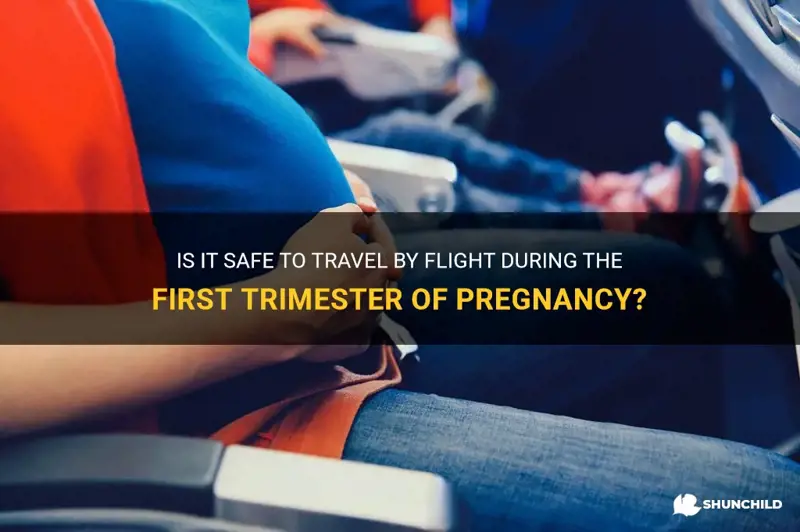
Traveling by flight during the first trimester of pregnancy can be a topic of concern for many expectant mothers. With the constant warnings and precautions associated with early pregnancy, it is natural to question the safety and feasibility of air travel during this time. However, with proper planning and necessary precautions, flying during the first trimester can be a safe and comfortable experience for pregnant women. In this article, we will explore the various factors to consider, the potential risks involved, and tips to ensure a smooth journey for expectant mothers during this crucial stage of pregnancy.
What You'll Learn
Is it safe for pregnant women to travel by flight during their first trimester of pregnancy, what precautions should pregnant women take if they need to travel by flight during their first trimester of pregnancy, are there any specific airlines or policies that pregnant women should consider when traveling by flight during their first trimester of pregnancy, what are the potential risks or complications associated with flying during the first trimester of pregnancy, are there any medical or health considerations that pregnant women should discuss with their healthcare provider before deciding to travel by flight during their first trimester of pregnancy.

Pregnancy is an exciting time, but it also brings about various concerns and limitations. One question that often arises is whether it is safe for pregnant women to travel by flight during their first trimester. Let's take a closer look at this topic to provide you with a comprehensive answer.
Scientific perspective:
According to the American College of Obstetricians and Gynecologists (ACOG), flying during the first trimester is generally considered safe for healthy pregnant women. The risk of miscarriage is significantly reduced after the first trimester, so it is generally safe to travel during this time. However, it is always advisable to consult with your healthcare provider before making any travel plans, as they can assess your individual circumstances and provide personalized advice.
Experience-based perspective:
Many women have successfully traveled by flight during their first trimester of pregnancy without any issues. It is essential to listen to your body and follow any advice given by your healthcare provider. If you have a healthy pregnancy and no complications, flying during the first trimester should not pose a significant risk.
Step-by-step guide:
If you decide to travel by flight during your first trimester, here are some steps to consider:
Step 1: Consult with your healthcare provider: Before making any travel plans, it is crucial to discuss your intentions with your healthcare provider. They can provide specific advice based on your medical history and any potential risks associated with your pregnancy.
Step 2: Choose a suitable destination: Select a destination that is safe and offers easy access to medical facilities in case of any emergencies. Avoid destinations with high altitudes, extreme weather conditions, or limited healthcare resources.
Step 3: Stay hydrated and comfortable: It is vital to drink plenty of water during the flight to stay hydrated. Additionally, wearing loose and comfortable clothing can help improve circulation and reduce the risk of blood clots. Consider wearing compression stockings, which can prevent swelling and improve blood flow.
Step 4: Take frequent breaks: If possible, try to get up and walk around the cabin periodically to stretch your legs. This can help prevent blood clots and reduce discomfort.
Step 5: Follow airline guidelines: Each airline may have specific policies regarding pregnant passengers. Familiarize yourself with these guidelines and make any necessary arrangements in advance, such as requesting an aisle seat for easy access to the restroom and stretching your legs.
Here are a couple of scenarios to illustrate the safe travel possibilities during the first trimester:
Example 1: Sarah is a healthy woman in her first trimester of pregnancy. She plans to travel to a nearby city for a family gathering. She discusses her plans with her healthcare provider, who assures her that it is safe to fly at this stage of her pregnancy. Sarah follows all the necessary precautions, such as staying hydrated, wearing comfortable clothing, and taking breaks during the flight. She has a successful trip and returns home without any complications.
Example 2: Amanda is in her first trimester of pregnancy and has a history of blood clotting issues. Her healthcare provider advises her against flying during her first trimester due to the increased risk of blood clots. Amanda follows her healthcare provider's advice and makes alternate travel arrangements, such as taking a short road trip instead. She prioritizes her health and pregnancy by making informed decisions.
In conclusion, flying during the first trimester of pregnancy is generally considered safe for healthy pregnant women. However, it is crucial to consult with your healthcare provider and follow their advice. Take necessary precautions, stay hydrated, wear comfortable clothing, and follow airline guidelines. By considering these factors, you can make an informed decision and have a safe and enjoyable travel experience during your first trimester.
The Importance of Folic Acid Intake During Pregnancy Factors
You may want to see also
Pregnancy is a beautiful and delicate stage in a woman's life. It comes with various physical and emotional changes, and as a pregnant woman, it is important to take special care of yourself and your baby. Traveling during the first trimester of pregnancy, especially by flight, requires extra precautions to ensure the safety and well-being of both mother and child.
One of the first steps pregnant women should take before planning any travel is to consult with their healthcare provider. This is especially important during the first trimester, as this is when the baby is developing the most. Your healthcare provider will be able to assess your individual situation and advise you on whether it is safe for you to travel by flight.
Assuming your healthcare provider gives you the green light to travel, there are several precautions you can take to ensure a safe and comfortable journey. Firstly, it is important to check the airline's policies regarding pregnancy and flying. Many airlines have specific guidelines and restrictions for pregnant women, so it is important to familiarize yourself with these before booking your flight. Some airlines may require a doctor's note or have limitations on how far along in your pregnancy you can fly.
Next, it is important to dress comfortably for your flight. Choose loose-fitting clothing that doesn't restrict your movement and wear shoes that are easy to slip on and off. It is also a good idea to bring a small pillow or cushion to provide extra support for your back and to help you maintain a comfortable sitting position.
During the flight, it is important to stay hydrated. Drink plenty of water and avoid caffeine, as it can dehydrate you. It is also a good idea to eat small, nutritious snacks throughout the flight to keep your energy levels up. Avoid heavy or greasy foods that may cause indigestion or discomfort.
To minimize the risk of blood clots, which pregnant women are already at a higher risk of developing, it is important to move around and stretch your legs regularly during the flight. Try to get up and walk around the cabin every hour or so, or perform simple leg exercises while seated. Wearing compression socks can also help improve circulation and reduce the risk of blood clots.
Lastly, it is important to listen to your body and take breaks as needed. If you start to feel uncomfortable or experience any pain or complications, notify the flight attendants immediately. They are trained to handle medical emergencies and can provide you with assistance if needed.
In conclusion, traveling by flight during the first trimester of pregnancy requires extra precautions to ensure the safety and well-being of both mother and child. Consulting with your healthcare provider, checking airline policies, dressing comfortably, staying hydrated, moving around regularly, and listening to your body are all important steps to take when traveling during this delicate stage. By following these precautions, you can have a safe and comfortable journey while minimizing any potential risks.
Exploring the Truth: Can You Make Love During Pregnancy?
Traveling during pregnancy can be a concern for many women, especially during the first trimester when morning sickness and fatigue are common. However, with the right precautions and considerations, air travel can be safe and comfortable during this time. In this article, we will discuss some specific airlines and policies that pregnant women should consider when planning a flight during their first trimester.
Firstly, it is important for pregnant women to check the policies of different airlines before booking a flight. Some airlines have specific guidelines regarding traveling during pregnancy, especially in the later stages. The policies may vary, so it is crucial to review and understand the rules of the chosen airline before making any arrangements. This can help avoid any unexpected issues or discomfort during the journey.
Secondly, pregnant women should consider the duration of the flight when planning their travel. Longer flights can be more tiring and uncomfortable, especially during the first trimester when fatigue is common. It is advisable to choose shorter flights whenever possible to minimize discomfort and reduce the risk of developing blood clots. Additionally, pregnant women should try to book flights with layovers that allow for regular breaks and opportunities to stretch and walk around.
Another important consideration is the availability of in-flight medical assistance. Some airlines have better facilities and medical assistance on board compared to others. It is recommended to choose airlines that have trained medical professionals on board and carry necessary equipment to handle any emergencies. This can provide a sense of security and peace of mind for pregnant women traveling during their first trimester.
Furthermore, pregnant women should take necessary measures to ensure their comfort and well-being during the flight. Wearing comfortable and loose-fitting clothing is essential to avoid any restriction or discomfort. Additionally, staying hydrated by drinking plenty of water and avoiding caffeine can help prevent dehydration and alleviate symptoms such as nausea and fatigue. It is also important to pack snacks and small meals to maintain energy levels during the flight.
Lastly, pregnant women should consult with their healthcare provider before embarking on any air travel during the first trimester. The healthcare provider can assess the individual's overall health and provide specific recommendations and guidelines based on their medical history. It is important to follow these recommendations and seek medical advice if any concerns or issues arise during the journey.
In conclusion, when traveling by flight during the first trimester of pregnancy, pregnant women should consider the policies of different airlines, the duration of the flight, the availability of in-flight medical assistance, and take necessary measures to ensure their comfort and well-being. Consulting with a healthcare provider is crucial to receive personalized advice and guidance. By following these tips, pregnant women can have a safe and comfortable journey during their first trimester of pregnancy.
Understanding the Normality of Daily Spotting During Pregnancy
Flying during the first trimester of pregnancy can be a cause for concern for some expectant mothers. While it is generally safe for pregnant women to fly, there are potential risks and complications that should be considered before planning a trip.
One of the main risks associated with flying during the first trimester of pregnancy is the possibility of miscarriage. Miscarriages are more common in the first trimester, and there is some evidence to suggest that the changes in air pressure and oxygen levels during a flight could increase the risk. However, the overall risk is still low, and many women fly without any issues during this time.
Another potential complication is the risk of deep vein thrombosis (DVT), which is a blood clot that forms in a deep vein, usually in the leg. Prolonged periods of sitting, such as during a long flight, can increase the risk of developing a DVT. Pregnant women are already at a higher risk of DVT due to hormonal changes and increased blood volume, so flying during the first trimester could potentially further increase their risk.
Additionally, flying can also cause discomfort and exacerbate common pregnancy symptoms such as nausea and fatigue. The changes in cabin pressure can make these symptoms more pronounced, making the flight uncomfortable for some pregnant women.
To minimize the risks and complications associated with flying during the first trimester, it is important to take certain precautions. First, it is recommended to consult with a healthcare provider before making any travel plans. They can assess an individual's specific medical history and advise on whether it is safe to fly.
If flying is deemed safe, there are several steps that can be taken to reduce the risks. Wearing compression socks can help improve blood circulation and reduce the risk of DVT. Staying hydrated throughout the flight is also important, as dehydration can contribute to the development of blood clots. Getting up and moving around the cabin regularly can also help prevent blood clots from forming.
It is also important to listen to your body and take breaks as needed. If you are feeling nauseous or fatigued, it is okay to take a break and rest during the flight. Bringing snacks and ginger candies can also help alleviate nausea symptoms.
In conclusion, flying during the first trimester of pregnancy carries potential risks and complications, including an increased risk of miscarriage and deep vein thrombosis. However, with proper precautions and consultation with a healthcare provider, many women are able to safely fly during this time. It is important to listen to your body, take breaks as needed, and stay hydrated to minimize any potential risks.
Is It Safe to Fly During the Third Month of Pregnancy?
Pregnancy is a beautiful and exciting time in a woman's life, but it can also bring about some unique challenges and considerations. One such consideration is whether or not it is safe for a pregnant woman to travel by flight, especially during the first trimester. Before making any travel plans, it is important for pregnant women to consult with their healthcare provider to discuss any potential medical or health considerations.
The first trimester of pregnancy is a critical period of fetal development, and there are several medical and health considerations that pregnant women should discuss with their healthcare provider before deciding to travel by flight. One of the main concerns is the risk of deep vein thrombosis (DVT), which is a blood clot that forms in the deep veins of the body, typically in the legs. Pregnancy itself increases the risk of developing DVT, and traveling by flight further increases this risk due to the prolonged periods of sitting and decreased circulation. Pregnant women should discuss with their healthcare provider the potential risk of DVT and ways to mitigate this risk, such as wearing compression stockings and taking frequent walks during the flight.
Another consideration is the risk of miscarriage. Although the risk of miscarriage is highest in the first trimester, the majority of miscarriages are not caused by travel or any other specific activity. However, some pregnant women may have a higher risk of miscarriage due to preexisting medical conditions or complications. It is important for these women to discuss their individual risks with their healthcare provider and determine if travel by flight is safe for them.
Additionally, pregnant women should discuss the potential effects of air travel on their overall health and comfort. The changes in cabin pressure and reduced oxygen levels during an airplane flight can cause discomfort and fatigue, which may be amplified in pregnant women. It is important to discuss any existing medical conditions or concerns and determine if flying is safe and advisable.
It is also important for pregnant women to consider the availability and quality of medical care at their planned destination. In the event of a medical emergency, it is crucial to have access to appropriate medical facilities and healthcare providers. Pregnant women should discuss the availability of prenatal care, the quality of medical facilities, and any potential risks associated with traveling to their planned destination.
In conclusion, there are several medical and health considerations that pregnant women should discuss with their healthcare provider before deciding to travel by flight during their first trimester. These considerations include the risk of deep vein thrombosis, the risk of miscarriage, the effects of air travel on overall health and comfort, and the availability and quality of medical care at the planned destination. It is important for pregnant women to consult with their healthcare provider to ensure a safe and healthy travel experience.
Understanding the Frequency of Vomiting During Pregnancy: What to Expect
Frequently asked questions.
It is generally considered safe to travel by flight during the first trimester of pregnancy. However, it is always recommended to consult with your healthcare provider before making any travel plans. They can provide personalized advice based on your specific health and pregnancy status.
Flying during the first trimester is generally safe for most pregnant women. However, there are some factors to consider, such as increased risk of blood clots and changes in air pressure. It is important to stay hydrated, move around frequently during the flight, and wear compression socks to minimize these risks.
If you are pregnant and traveling by flight during the first trimester, it is important to take certain precautions. These include wearing comfortable clothing, choosing an aisle seat for easy access to the restroom, and drinking plenty of water to stay hydrated. It is also recommended to limit your caffeine intake and avoid heavy meals before the flight to minimize discomfort.
There is no conclusive evidence to suggest that flying during the first trimester increases the risk of miscarriage for most women. However, if you have a high-risk pregnancy or a history of complications, it is important to discuss your travel plans with your healthcare provider for personalized advice.
If you experience any pregnancy symptoms or discomfort during the flight, it is important to notify the flight attendants. They can provide assistance and ensure you have a comfortable journey. It is also important to listen to your body and take breaks to stretch and move around as needed.

- Vanessa Lin Author Doctor

- Aine Sawyer Author Editor Reviewer
It is awesome. Thank you for your feedback!
We are sorry. Plesae let us know what went wrong?
We will update our content. Thank you for your feedback!
Leave a comment
Understanding fertility photos, related posts.

Is It Safe to Use Oregano Oil on Your Feet During Pregnancy?
- Feb 12, 2024

Is it Safe to Drink Kabasura Kudineer During Pregnancy?
- Feb 07, 2024

Is it Safe to Administer the Measles Vaccine to Pregnant Women?
- Feb 09, 2024

Is It Safe to Eat Deli Meats During Pregnancy? Here's What You Need to Know
- Feb 10, 2024

Is it Feasible to Buy a House While Pregnant?
- Feb 06, 2024

Understanding How Pregnancy Can Impact Your Hormones
- Feb 13, 2024

What It’s Like To Travel During First Trimester of Your Pregnancy
Now that the secret is out I am excited to share a bit about what I’ve learned from traveling while pregnant the last few months. I want to share because when I was googling I didn’t find close to enough on the subject. In some ways, it’s the same as travel used to be, but in many ways, it’s pretty different to travel during first trimester.
By the end of this pregnancy I will have (hopefully) traveled during all three trimesters, so I suppose this is part one of a three-part series. (See Part 2 and Part 3 Here) When I was 12 weeks pregnant, in February, I went on a work assignment to Iceland . I was pretty nervous. I was only just starting to feel human again after several months of feeling completely crappy (seriously, early pregnancy felt just like when I had Mono senior year of high school). But this assignment was too good to pass up and truthfully I was dying to see Iceland again , so I decided to power through. Here is what I learned for you guys:
What It’s Like To Travel During First Trimester
Important Caveat : If there is one thing I’ve learned from pregnancy it’s that every single woman’s body is completely and utterly different. I also have fortunately have had a healthy, very low-risk pregnancy. My experience may not be your experience, but hopefully, it can at least give you an idea of what to expect. As always, you should talk to your doctor about any special concerns you might have.
Destination Matters

Your first trimester of pregnancy can be pretty scary because you have a higher chance of miscarriage through those first few months. As a result, you may want to choose your destination carefully – you will want to have easy access to a hospital in case god forbid, something happens. It’s not really the time to go wandering off in the Amazon or visit a remote tiny island.
Which isn’t to say you absolutely can’t. Look at my friend Nellie who traveled all through Central Asia, walked the Camino de Santiago and camped in Mongolia while pregnant (of course, she didn’t know she was pregnant at the time). For every rule, someone is the exception.
Of course, if I had full choice, I’m not sure I would have gone with Iceland during a time I had to miss out on the amazing hot springs, but at least I’d been to the Blue Lagoon previously.
Long Flights seem Even Longer

Flying is pretty uncomfortable in the best of times, so of course, it’s even worse when you travel during first trimester. The flight to Iceland was a solid 8 hours, and even though IcelandAir boosted me up to Economy Plus (thank goodness) it felt epically long.
TIP : Get an aisle seat. Pregnant ladies are at a higher risk for blood clots so it’s important to get up and move every hour or so. Luckily you will probably have to pee every hour or so anyways so that’s the perfect excuse. My OB told me not to bother with compression socks but do whatever makes you comfortable.
TIP : Bring snacks! When a pregnant lady is hungry it’s a serious emergency. Don’t leave yourself at the mercy of inflight meals; pack lots of snacks for yourself just in case. I brought string cheese, granola bars, chocolate and a couple other goodies and kept them in my bag all trip long just in case the hunger pangs hit.
Jet Lag is a Real Bitch

The worst part of the first trimester (for me anyways) was the bone shattering tiredness that made it feel impossible to do much of anything. Although that had started to clear by week 12, jet lag definitely compounded the feeling, causing me to doze off all over the place. Give yourself a break and try to opt for an easier itinerary with lots of potential nap breaks.
The lag was even worse when I got home, knocking me flat on the couch for several days. If you travel during first trimester of your pregnancy definitely schedule yourself a cushion for recovery time.
TIP : Allow yourself the caffeine if you need it. My doctor told me 200-300 mg of caffeine a day is fine. That’s several cups of coffee or tea that can make all the difference in actually being alert enough to enjoy your day. This is obviously a personal choice, but my feeling is that when you travel during first trimester it is no time to try to be a hero.
TIP : Drink tons of water. Pregnant women are already supposed to consume 64 oz of water a day, but during travel, I would try to up that. Flying is dehydrating. Jetlag is dehydrating. You’ve got some compensating to do.
Drink a ton of water the day before your flight (and avoid salty snacks). Bring your own water bottle and refill it every chance you get for maximum hydration. Remember that the caffeine I mentioned above can be dehydrating so chase your coffee with water.
Your Diet Will Change

Everyone knows that one of the hardest parts of the first trimester is morning sickness. I got off relatively easy- no puking for this girl, but I did have a lot of aversions to things I typically love, like most red meat and a lot of vegetables. When you couple this with the list of off-limit food items that every preggo gets to know by heart, menu options can feel pretty limited.
Somewhat luckily for me, Icelandic cuisine isn’t really my favorite, to begin with. I wasn’t too bummed to miss out on the smoked lamb, or the ubiquitous hotdogs (both pregnancy no-nos). Other stuff was harder, like the gorgeous local steak that I had to order ( sigh ) well done.
TIP : Let people know what’s going on. Normally people try to keep their pregnancy a secret during the first trimester, but I think it’s okay to have looser lips when you travel during first trimester. One night my hosts took me to a restaurant known for its craft cocktails. It was definitely a bummer to sip my plain water when everyone else had fancy drinks. Luckily my companions knew what was up and asked the bartender to make me a custom mocktail, which definitely cheered me up!
TIP : Go easy on yourself. My biggest suggestion is to just let yourself off the hook. Maybe you’re not going to eat as locally as you might like, but that’s okay this time around. If like me, you just want to order avocado toast for lunch every day, just do it. If you’re craving ice cream even though it’s 10 degrees outside… well who is going to tell a pregnant lady no?
It’s Still Doable

Yes, pregnancy is a huge, life-altering event, but man, pregnancy is long. You have to get on with your life even while you’re growing a baby. For a lot of people that means still traveling – either for business or pleasure. While the first trimester isn’t the easiest or most enjoyable time to be traveling, it’s certainly doable. I think it’s important to know yourself and your limits and to give yourself the slack you need.
In the end, I was really glad I went to Iceland, but also really happy when it was time to come home. I’m happy that I went at the tail end of my first trimester when my symptoms weren’t quite as severe as they had been even a couple weeks previously.
The best part of my trip was on the last day when I browsed the shops in downtown Reykjavik and picked out a children’s book for my soon-to-be baby. A memento of the first trip we ever took together.
Read on to see how travel during my second trimester and third trimester went as well!
Pin for Later:

About The Author
12 thoughts on “What It’s Like To Travel During First Trimester of Your Pregnancy”
Thank you so much for this article. I’m 9 weeks pregnant and just returned from a work conference on the other side of the world (14 hour time difference). The tiredness and food hassles were my main issues. But I also told a few work colleagues at the conference and this was super helpful! Thanks for sharing your experience. I’m glad I went, but gosh it was tiring.
Great article, thanks! I’m going to Iceland next month, if all goes to plan I’ll be 11 weeks. Can I ask if you travelled around to any of the more remote areas, or just stayed near Reyjavik? I’m just a little bit worried about access to medical care if anything goes wrong.
Going in thw geothermal spas and hot pools are fine as you stay hydrated. Icelandic women all do it and babies are fine!
If I were in the same position again I would probably go for it. Oh well!
Thank you for posting. I’m in my first trimester as well, and am leaving for Iceland in two weeks (I’ll be there for weeks 10 & 11). From the pictures and menus I’ve seen it looks like they eat a lot of deli-style meats. Did you find this as well? If so, do they have similar concerns about Listeria there, so we should avoid it? Thank you! P.S. I loved your article and was doing fine until your last line about the book for your baby as a memento of your first trip together – then I lost it. Such a sweet idea. ❤
They eat a lot of smoked meat, which is a listeria no no. I avoided it, partly b/c I think smoked lamb is really really gross. Deli meat is fine as long as it’s served hot so when in doubt just have them heat it up I think.
Congrats! And thanks for showing you don’t have to stop exploring the world with a baby on the way. Traveling during pregnancy is perfectly fine – as long as you listen to your body. My parents traveled all over Europe and Asia while my mom was pregnant with me, and that was almost 26 years ago. Thanks to her, I think I caught the travel bug before I was even born! 🙂
I’m glad you didn’t suffer from any morning sickness! Really interesting post, thanks for sharing.
Happy travels 🙂
Apparently it’s genetic- my mom never had it either.
Great advice Steph. I travelled all through my (healthy) pregnancies and you really just have to make a few small tweaks to make travelling while pregnant work. 🙂
I found your articles really helpful!
You’re so right – there is next to no information about this online! I’m so glad I’m growing up in a generation of women who are taking their lives and decisions into their own hands and still finding ways to live out multiple dreams at the same time! Good luck with the next few months, can’t wait to hear about the next adventure!
Leave a Comment Cancel Reply
Your email address will not be published. Required fields are marked *
- Weird But True
- Sex & Relationships
- Viral Trends
- Human Interest
- Fashion & Beauty
- Food & Drink
trending now in Lifestyle

Dear Abby: My parents expect me to take off work to baby-sit...

Plane passenger's coat faux pas stirs heated debate: 'Nobody is...

‘I flew over 1,500 miles to meet man I'd been talking to online...

Dentist reveals the 3 times you should not brush your teeth

McDonald’s brings back bagels as one way to offset California...

I'm an ex-Mormon — here's why members of my former church look...

WFH employee fired after boss tracked her laptop activity breaks...

I'm a dietitian — and these foods don't deserve their bad...
Thanks for contacting us. We've received your submission.
A dentist has gone viral on TikTok after sharing the circumstances in which you should skip brushing your teeth — at least for awhile.
Dr. Shaadi Manouchehri, clinical director at Smart Dental Aesthetics and director at the London School of Facial Esthetics in England, sparked online conversations after she shocked viewers by saying you should not scrub your pearly whites at those times when reaching for a toothbrush and toothpaste is likely the first thing you’d do.
In the video, which currently has more than 12 million views, Manouchehri said that for one, you should not brush your teeth after vomiting — which quickly ignited questions in the comments section.
“I literally have to brush my teeth after throwing up,” one TikTok user argued.
“My mom always made me brush my teeth after vomiting,” another person said.
“Learned the first one in pregnancy!” a woman wrote. “Mouthwash was my best friend that first trimester.”
Manouchehri said that, in addition to holding off after vomiting, people should not brush their teeth after eating breakfast or sweets.
“Ah, yes, the three times I want to brush my teeth more than any other time,” a TikTok user commented.

There is one factor that links the three circumstances together, said Manouchehri: pH levels, or acidity in the mouth.
“Your teeth are minerals and an acid could quite literally dissolve them,” Manouchehri told Fox News Digital in an interview.
“When we eat anything, be it breakfast, lunch, snack, sweet things in particular, the bacteria on your teeth metabolize this and turn it into an acid so that you can brush straight away.”

She added, “[It’s] the exact same concept with vomiting. Obviously, the stomach contents are very acidic. So, if you brush your teeth straight away, you’re basically rubbing the acid onto your teeth, which can damage them.”
The acidity in the mouth will naturally neutralize overtime — but that time period can take roughly 30 to 60 minutes for the salivary buffers to act, she said.
It may sound like a challenge to hold off on brushing teeth immediately after vomiting in the hope of getting the taste out of the mouth — but Manouchehri offered a few tips that could help speed up the process.
“Things like drinking water [and] chewing sugar-free chewing gum … will accumulate more saliva so that it can neutralize the acid quicker,” she added.
Manouchehri advised waiting 30 to 60 minutes after vomiting or eating breakfast and/or sweets before you brush your teeth again, so that the mouth has time to neutralize the high pH levels.
While these are not the only times you should avoid brushing your teeth, Manouchehri highlighted these three because they are times in which people desperately want to brush their teeth immediately, she said.
In the mornings, you can be in a rush after eating breakfast — and then reach for your toothbrush.
Manouchehri said that she also doesn’t like the feeling of breakfast still in her mouth, so she has come up with a routine that gives her enough time to enjoy her morning meal and wait the amount of time needed for her pH levels to neutralize.
As for sweets, she said, that includes anything with sugar, whether it’s a sweet beverage or a decadent dessert.
Sugar is metabolized by bacteria on the teeth, which then creates an acid, Manouchehri said.

“So, we eat sweets [and] the bacteria on our teeth also feed on that sweet,” Manouchehri said.
Even though you have to wait to brush your teeth, there are still things you can do to alleviate the annoyance of acid residue and speed up the neutralizing process.
Tips to try
Try alcohol-free mouthwash to rinse everything out, said Manouchehri. This can remove the acidic content from your mouth without damaging your teeth.
@drshaadimanouchehri #dentist #dentistry #dentaladvice #learnontiktok #funfacts #londondentist #dentalcleaning #teethbrushing #teethbrushingmadeeasy #teethbrushingtips #londondentistry #marylebonedentist #fypシ ♬ original sound – Dr Shaadi Manouchehri
Sugar-free gum is another great alternative because it helps with “saliva production and that saliva naturally is going to help everything just neutralize a bit,” she added.
Dr. Lucynda Raben, DDS, of Wichita, Kansas, agreed with Manouchehri’s advice — but took the tips even further by generalizing it.
Raben said you should not immediately brush your teeth after “eating, drinking or vomiting.”

“The premise of this doctor is correct. I would, however, probably reframe her statement to [say that] we want to make a change in the timing,” Raben told Fox News Digital.
“It is still a good idea to brush after eating, but that brushing should be delayed until the pH has returned to a pH of 5.6 or even better to a neutral pH of 7.0,” Raben said.
Raben agreed that these instances feel like the right time to brush because that is what people believed to be true for so long.

Now that more and more research has been done, the effects of acid in the mouth have shown that brushing immediately does more harm than good.
Start your day with all you need to know
Morning Report delivers the latest news, videos, photos and more.
Thanks for signing up!
Please provide a valid email address.
By clicking above you agree to the Terms of Use and Privacy Policy .
Never miss a story.
“The result of brushing in an acid environment is insidious. Doing this occasionally can be tolerated, and the effect is not noticeable,” Raben continued.
However, if the strong habit is established, she said, “this thinning and weakened tooth structure will show up years later.”
The Mayo Clinic, on its website , notes the following: “To protect your teeth, don’t brush them right after having food or drinks that contain a lot of acids. Examples include soft drinks, such as soda and sports drinks, sour candies, citrus juices and citrus fruits. The acid in them can soften the enamel.”

It adds, “Brushing too soon after you eat or drink something acidic can take the enamel off your teeth. Wait an hour to brush. During that time, your saliva washes away the acid and the enamel hardens again.”
Among its other dental care tips:
- Get a new toothbrush every 3 to 4 months. Replace it sooner if the bristles become worn down, bent or broken.
- Don’t smoke or use other tobacco products.
- See a dentist regularly for cleanings and checkups.
Share this article:

Advertisement
BarkBox’s next big delivery: Charter flights for dogs
Starting in may, bark air will fly dogs and their owners from new york to l.a. or london.

BarkBox, the service that assembles and ships care packages for dogs to millions of subscribers each month, is expanding into a new market: pet-friendly charter flights. This spring, the company will begin transporting dogs (and their owners) on private planes via Bark Air.
Starting on May 23, Bark Air will fly weekly between Westchester County Airport in White Plains, N.Y., and Van Nuys Airport in Los Angeles. The following week, it will kick off bimonthly service between Westchester and London Stansted Airport. Reservations at dogsflyfirst.com will go live Thursday, on National Pet Day. The one-way cross-country flight costs $6,000 for one dog and one owner; the transatlantic flight goes for $8,000.
By comparison, for the same date as the launch, nonstop air on a major carrier starts at $220 one way from New York to Los Angeles and from $525 to London. Adding a dog would cost more.
Bark chief executive and co-founder Matt Meeker said the inspiration for Bark Air came from his Great Dane. Hugo visited nearly two dozen states and Canada during his 12-year lifetime, but he never pranced around the West Coast or Europe because of the challenges of flying pets, especially of his size.
Options are limited for pets too large for the cabin. Depending on the season, destination and airline, owners can transport their dogs as checked luggage or cargo, an arrangement that comes with risks. According to Transportation Department data, U.S. carriers reported nine incidents involving animals, including seven deaths, in 2022. (The agency has not published its annual 2023 numbers for these incidents).
To understand the experience of traveling as baggage, Meeker packed himself into a crate and was rolled across the tarmac and loaded onto a plane, where he stayed in his enclosure for 45 minutes to an hour. His experiment confirmed his suspicions: Flying in the belly of a plane can be traumatizing.
“It was very cramped, very dark. Loud noises. Disorienting. No food or water. Nowhere to go to the bathroom,” said Meeker. “It was very, very terrible.”
Moneyed travelers can book a private or charter plane. However, noncommercial air can be prohibitively expensive or unpredictable. K9 Jets , a private charter operator that started offering pet-friendly flights last year, flies to 13 destinations, including Dallas, Paris and West Palm Beach, Fla. It has similar prices to BarkAir — $6,650 from New Jersey to Los Angeles — but will cancel the flight if it is not at least 75 percent full.
“There’s a huge amount of interest and demand, and really frustration,” Meeker said. “People are looking for a reasonable solution to transport their dog if they’re moving or taking a summer vacation or weekend trip.”
Meeker said the company partnered with Talon Air , a New York-based charter company that will fly two Gulfstream G550s under the Bark Air banner. The plane can accommodate 14 passengers, but the company will cap the number at 10.
After the traveler books the flight, a concierge will contact the family to learn about the dog’s temperament and to help with logistics, including the documents required to enter England. The fare includes complimentary car service within a 30-mile radius of the arrival destination.
Meeker recommends passengers arrive 45 minutes to an hour before departure. Guests will wait in a private area inside the terminal, where a chef will prepare a hot meal for the human travelers to avoid any in-flight tray-table surfing. Before boarding, the dogs will have a chance to sniff each other out.
Onboard, pets can fly without a leash as long as they behave. During a test run, Meeker said the dogs were very courteous, with no unruly outbursts.
“They would say hello to the other dogs and say hello to the other people. Everyone was very calm about it,” he said. “For dogs who were a little more nervous, or people who were more nervous for their dogs, we have a place on the plane for them to sit without anyone bothering them.”
Since the pups are the top dogs onboard, the carrier will cater to their tastes. The menu will feature “Doggie Champagne” (actually chicken broth), doughnuts made for dogs and meaty snacks served on a silver tray. The flight crew will include professionals trained in veterinary care and dog behavior. At the end of the trip, the four-legged fliers will earn their wings, which they can proudly pin to their collar or harness.
If Bark Air does well, Meeker hopes to add larger planes to the fleet, which could help lower the fare. He also dreams of building the world’s first in-flight dog park.
“The dogs for those longer journeys will have a park where they can play with other dogs while their humans enjoy a drink at the bar around the edge of the park,” he said.
Henry Harteveldt, a travel industry analyst with the Atmosphere Research Group, said pet airlines are more apt to fail than succeed. (RIP, Pet Airways.) However, Bark Air has a few advantages. It is not building an airline from scratch. It has brand recognition. And it oversees a mailing list with the names of millions of pet lovers willing to drop a small fortune on their pooches.
“Some people will absolutely do this,” Harteveldt said. “The question is: Will there be a enough people who love their pets enough to pay $6,000 or more to transport them coast-to-coast or from New York to London?”
More on air travel
Leave flying to the pros: Think you could land a plane in an emergency? Experts say you’re wrong . Here’s what you should actually do if something goes awry during a flight .
Pet peeves: Why do “gate lice” line up early for a flight ? Psychologists explained for us. Another move that annoys airline workers: abusing the flight attendant call button . For more on how to behave on a flight, check out our 52 definitive rules of flying .
Plane mess: Stories about extremely disgusting airplanes have been grossing out travelers. The question of plane cleanups became the subject of a recent debate after a flight attendant allegedly told a pregnant passenger to pick up the popcorn spilled by her toddler.
Frequent flying: Airline status isn’t what it used to be, but at least there are some good movies and TV shows to watch in the air. And somewhere out there, experts are trying to make airline food taste good.

- Election 2024
- Entertainment
- Newsletters
- Photography
- Personal Finance
- AP Investigations
- AP Buyline Personal Finance
- Press Releases
- Israel-Hamas War
- Russia-Ukraine War
- Global elections
- Asia Pacific
- Latin America
- Middle East
- Election Results
- Delegate Tracker
- AP & Elections
- March Madness
- AP Top 25 Poll
- Movie reviews
- Book reviews
- Personal finance
- Financial Markets
- Business Highlights
- Financial wellness
- Artificial Intelligence
- Social Media
Delta Air Lines posts a narrow Q1 profit and says travel demand remains strong despite flight scares
FILE - A Delta Air Lines plane lands at Logan International Airport, Jan. 26, 2023, in Boston. Delta reports earnings on Wednesday, April 10, 2024. (AP Photo/Michael Dwyer, File)
- Copy Link copied
Delta Air Lines eked out a narrow first-quarter profit and said Wednesday that demand for travel is strong heading into the summer vacation season, with travelers seemingly unfazed by recent incidents in the industry that ranged from a panel blowing off a jetliner in flight to a tire falling off another plane during takeoff.
Delta reported the highest revenue for any first quarter in its history and a $37 million profit. It expects record-breaking revenue in the current quarter as well. The airline said that second-quarter earnings will likely beat Wall Street expectations.
CEO Ed Bastian said Delta’s best 11 days ever for ticket sales occurred during the early weeks of 2024.
If travelers are worried about a spate of problem flights and increased scrutiny of plane maker Boeing , “I haven’t seen it,” Bastian said in an interview. “I only look at my numbers. Demand is the healthiest I’ve ever seen.”
A slight majority of Delta’s fleet of more than 950 planes are Boeing models, but in recent years it has bought primarily from Airbus , including a January order for 20 big Airbus A350s. As a result, Delta will avoid the dilemma facing rivals United Airlines and American Airlines, which can’t get all the Boeing planes they ordered. United is even asking pilots to take unpaid time off in May because of a plane shortage.
“Airbus has been consistent throughout these last five years (at) meeting their delivery targets,” Bastian said.
Delta does not operate any Boeing 737 Max jets, the plane that was grounded worldwide after two fatal crashes in 2018 and 2019, and which suffered the panel blowout on an Alaska Airlines flight this year. However, the Atlanta-based airline has ordered a new, larger version of the Max that still hasn’t been approved by regulators. Bastian said Delta will be happy to use the Max 10 when they arrive.
While Delta has largely dodged headaches caused by Boeing, it faces other obstacles in handling this summer’s crowds.
Delta is lobbying the federal government to again allow it to operate fewer flights into the New York City area. Otherwise, Delta could lose valuable takeoff and landing slots.
The Federal Aviation Administration granted a similar request last summer and even extended it until late October . The FAA said the relief helped airlines reduce canceled flights at the region’s busy three main airports by 40%.
Peter Carter, an executive vice president who oversees government affairs, said Delta and other airlines need another waiver permitting fewer flights this summer because the FAA still doesn’t have enough air traffic controllers.
“Absent the waiver, I think we would have, as an industry, some real challenges in New York,” Carter said.
Airlines for America, a trade group of the major U.S. carriers, is also pushing for a waiver from rules on minimum flights in New York. The FAA said it would review the request.
Delta customers will see another change — a new system for boarding planes . Instead of boarding by groups with names such as Diamond Medallions, Delta Premium Select and Sky Priority, passengers will board in groups numbered one through eight. The airline says it will be less confusing.
“When you have a number and you’re standing in line, we are all trained to know when it’s our turn,” Bastian said.
The change won’t alter the pecking order of when each type of customer gets to board. Those with the cheapest tickets, Basic Economy, will still board last.
Delta’s first-quarter profit follows a $363 million loss a year ago, when the results were weighed down by spending on a new labor contract with pilots.
“We expect Delta to be one of the few airlines to report a profit in the March quarter,” TD Cowen analyst Helane Becker said even before Delta’s results were released.
Delta said that excluding special items, it earned 45 cents per share. Analysts were expecting 36 cents per share, according to a FactSet survey.
The airline forecast second-quarter earnings of $2.20 to $2.50 per share. The Wall Street consensus was $2.22 per share. The company stood by its forecast of full-year earnings between $6 and $7 per share.
First-quarter revenue rose 8%, to $13.75 billion. Putting Delta’s Pennsylvania refinery aside, operating revenue was slightly more than analysts predicted. The airline said second-quarter revenue will be 5% to 7% higher than a year ago.
The airline reported that large corporate customers — who were slower than leisure travelers to resume flying after the coronavirus pandemic — are spending more on travel, including firms in technology and financial services.
Delta has boosted profit by focusing more on premium passengers who pay the highest fares, and raking in money from a credit-card partnership with American Express.
Costs could rise too, however. Jet fuel is higher than it was a year ago, following a run-up in oil prices, and Delta is spending more on aircraft maintenance this year.
Shares of Delta Air Lines Inc. fell 2.3% by the end of regular trading Wednesday.

IMAGES
VIDEO
COMMENTS
Common Myths About Pregnancy and Air Travel . The first trimester is actually an especially low-risk time to travel during pregnancy.Contrary to popular belief, noise vibration, cosmic radiation ...
If your health care provider says it's okay for you to fly, and your plans are flexible, the best time to travel by air might be during the second trimester. The risks of common pregnancy emergencies are lowest during that time. When you fly: Buckle up. During the trip, keep your seatbelt fastened when you are seated, and secure it under your ...
Yes. You can choose to travel in the first trimester of pregnancy if you feel well and your pregnancy is healthy. There are, however, important considerations when planning a trip during your pregnancy. In most cases, you can safely travel in your first trimester of pregnancy. The risk for a miscarriage is higher in the early months of ...
Traveling in the first trimester can range from "no big deal" to "I think I'm going to die from misery right this very instant." Symptoms in early pregnancy can vary widely and can change by the day. A flight in your first trimester may be no different from any other flight you've ever taken or it may feel like you are flying with the worst ...
Virgin Australia. No restrictions. Travel permitted; requires a medical certificate dated within 10 days of departure date once you reach 28 weeks. For flights longer than four hours, travel is not permitted after 36 weeks of pregnancy (32 weeks if pregnant with multiples), or within 48 hours of normal vaginal delivery.
Occasional air travel during pregnancy is generally safe. Recent cohort studies suggest no increase in adverse pregnancy outcomes for occasional air travelers 1 2. Most commercial airlines allow pregnant women to fly up to 36 weeks of gestation. Some restrict pregnant women from international flights earlier in gestation and some require ...
The First Trimester Is Rough, Regardless of Flight Class. ... Again, if you can avoid it, most doctors recommend ceasing all plane travel no later than 36 weeks in the pregnancy. The grounding ...
The Science on Pregnancy and Air Travel . For ethical reasons, there are not many studies on air travel and miscarriage rates. One 2015 study showed a slight increase in first-trimester miscarriage for flight attendants, but this was often associated with high physical job demands and disruptions to their sleep cycles.
Unless you're carrying multiple or have another condition, first- and second-trimester travel is usually OK. As your due date approaches, stay closer to home.
It's fine to fly in the third trimester but you're advised to do it before 37 weeks, or before 32 weeks in an uncomplicated twin pregnancy. That's because you could go into labour any time after those dates. Do still check with your specific airline before you fly though. Many airlines have restrictions on travel in advanced pregnancy.
During a healthy pregnancy, occasional air travel is almost always safe. Most airlines allow you to fly domestically until about 36 weeks of pregnancy. Your ob-gyn can provide proof of your due date if you need it. If you are planning an international flight, the cut-off for traveling may be earlier. Check with your airline.
It will help keep blood flowing. In the seat, flex and extend your ankles to boost circulation. Best airplane seat. An aisle seat will make it easier to get in and out for walks and trips to the ...
Flying while pregnant can increase your chances of developing deep vein thrombosis (DVT). Experts suggest getting out of your seat and walking the length of the plane every hour to improve blood circulation. Also consider wearing compression socks to prevent swelling and blood clots, as well as achiness and fatigue.
During Travel. Your feet may become swollen on a long flight, so wear comfortable shoes and loose clothing and try to walk around every hour or so. Sitting for a long time, like on long flight, increases your chances of getting blood clots, or deep vein thrombosis. Pregnant women are also more likely to get blood clots.
So is it actually safe to get on a plane or to take a long road trip in the first few months of pregnancy? As a general answer, yes. Travel up to 36 weeks is generally considered safe. ... Though first-trimester travel, or any travel during pregnancy for that matter, isn't necessarily the most comfortable, at least you don't have to worry ...
First, make sure to drink plenty of fluids. Airplane cabins are very dry, so it's important to stay hydrated. Second, avoid touching your face. There are all sorts of germs on airplane tray tables and armrests, so it's best to keep your hands away from your eyes, nose, and mouth.
Travel During Pregnancy. As long as there are no identified complications or concerns with your pregnancy, it is generally safe to travel during your pregnancy. The ideal time to travel during pregnancy is the second trimester. In most cases, you are past the morning sickness of the first trimester and several weeks from the third stage of ...
Some women prefer not to travel in the first 12 weeks of pregnancy because of nausea and vomiting and feeling very tired during these early stages. The risk of miscarriage is also higher in the first 3 months, whether you're travelling or not. Travelling in the final months of pregnancy can be tiring and uncomfortable.
Traveling by flight during the first trimester of pregnancy can be a topic of concern for many expectant mothers. With the constant warnings and precautions associated with early pregnancy, it is natural to question the safety and feasibility of air travel during this time.
Tazuke says there are a few precautions pregnant women should take when flying, however, including hydrating properly (dehydration can cause cramping) and moving around on the plane to avoid deep vein thrombosis. Once a heartbeat is seen on ultrasound at about six or seven weeks, Brightman says " the risk of miscarriage does decline ...
Flying is pretty uncomfortable in the best of times, so of course, it's even worse when you travel during first trimester. The flight to Iceland was a solid 8 hours, and even though IcelandAir boosted me up to Economy Plus (thank goodness) it felt epically long. TIP: Get an aisle seat. Pregnant ladies are at a higher risk for blood clots so ...
"My mom always made me brush my teeth after vomiting," another person said. "Learned the first one in pregnancy!" a woman wrote. "Mouthwash was my best friend that first trimester."
XB-1's first flight met all of its test objectives, including safely reaching an altitude of 7,120 feet (2,170 meters) and speeds of up to 238 knots (273 miles per hour).
Bark, the company behind BarkBox, will fly dogs and owners between White Plains, N.Y., and Los Angeles or London. (BarkAir) BarkBox, the service that assembles and ships care packages for dogs to ...
Delta Air Lines eked out a narrow first-quarter profit and said Wednesday that demand for travel is strong heading into the summer vacation season, with travelers seemingly unfazed by recent incidents in the industry that ranged from a panel blowing off a jetliner in flight to a tire falling off another plane during takeoff.. Delta reported the highest revenue for any first quarter in its ...